#Identify Your Data Sources
Explore tagged Tumblr posts
Text
The Future of Business Growth: AI-Powered Development Strat
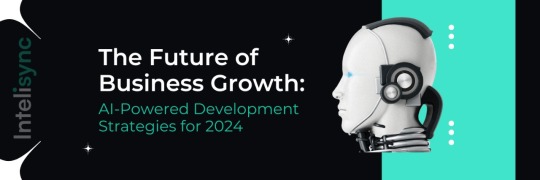
AI-powered development is revolutionizing business growth, efficiency, and innovation. By 2024, businesses that harness AI's potential will achieve unprecedented growth, outpacing their competitors. AI's incorporation into business operations enhances productivity, accuracy, and customer experience, driving revenue growth. McKinsey's report indicates that AI could deliver an additional $13 trillion to the global economy by 2030. With the global AI market expected to grow at a CAGR of 37.3% from 2023 to 2030, AI's role in business is becoming increasingly crucial.
AI-powered development uses advanced technologies like machine learning, natural language processing, and computer vision to perform tasks that typically require human intelligence. AI is transforming industries from finance to healthcare, providing solutions like automated trading systems and predictive diagnostics. AI enhances efficiency by automating repetitive tasks, optimizing operations, and enabling employees to focus on strategic activities. AI-driven chatbots and virtual assistants offer real-time support and personalized interactions, improving customer experience. AI's predictive analytics capabilities provide data-driven insights, helping businesses make informed decisions and stay ahead of market trends.
For businesses to fully leverage AI's benefits, a strategic approach to AI implementation is essential. This includes evaluating goals, identifying data sources, selecting appropriate AI tools, and investing in training and education. Addressing challenges like data privacy, system integration, and ethical considerations is critical for successful AI adoption. Partnering with Intelisync can facilitate this process, providing comprehensive AI services that ensure successful AI integration and maximize business impact. Intelisync's expertise in machine learning, data analytics, and AI-driven automation helps businesses unlock their full potential. Contact Intelisync today to start your AI journey and transform your Learn more....
#AI Development#AI-Powered Development for Businesses#AI-Powered Development: Boosting Business Growth in 2024#Blockchain Development Solution: Intelisync Boost Decision-Making#Boosting Business Growth in 2024#Challenges and Considerations in AI Adoption#Choose the Right AI Tools and Technologies#Evaluate your Goals and Needs#How can AI drive innovation in my business?#How can AI increase efficiency in my business?#How can Intelisync help with AI implementation?#Identify the Right Data Sources#Implementing AI in Your Business Improved Customer Experience#Increased Efficiency Innovation and Competitive Advantage#Intelisync AI Consulting#intelisync ai service Invest in Training and Education#Top 5 Benefits of AI#Top 5 Benefits of AI-Powered Development for Businesses#Understanding AI-Powered Development#Vendor Selection#What is AI Development#What is AI-Powered Development#What is the Future of AI-Powered Development in Business?#intelisync ai development service.
0 notes
Text
[I]n 2021, Glassdoor acquired Fishbowl, a professional networking app that integrated with Glassdoor last July. This acquisition meant that every Glassdoor user was automatically signed up for a Fishbowl account. And because Fishbowl requires users to verify their identities, Glassdoor's terms of service changed to require all users to be verified. … Ever since Glassdoor's integration with Fishbowl, Glassdoor's terms say that Glassdoor "may update your Profile with information we obtain from third parties. We may also use personal data you provide to us via your resume(s) or our other services." This effort to gather information on Fishbowl users includes Glassdoor staff consulting publicly available sources to verify information that is then used to update Glassdoor users' accounts.
Holy shit this is a bad move. Maybe consider deleting your Glassdoor account if you have one? I don't have any experience with Blind, but I hope they don't pull any dumb stunts like this one.
5K notes
·
View notes
Text
🚨Reblog for Awareness!
Hello everyone,
Recently RFK Jr has publicly said that he wants to collect medical data from private insurances (and other agencies and sources) in order to enter the data into a database to track people with Autism. He also mentioned they are creating an Autism Registry where people with Autism's data will be tracked and linked back to the patient they are studying.
With that, this is a HIPPA violation, among other things. I implore you to please reach out to your representatives regarding this. This is a slippery slope. RFK Jr is aiming to find a cure to Autism and identify toxins that cause Autism. In case you didn't already know, Autism is a neurotype and not a disease. It cannot be cured. Many have pointed out that because Autism tends to be genetic that this could turn into a Eugenics problem, as the government is trying to prevent Autistic people from being encouraged to reproduce, and stop Autism altogether. As a result of that, normal people are calling for sterilization of Autistic people, and being fed misinformation regarding Autism and vaccines. RFK Jr is refusing to listen to Autism organizations and advocates, but you can speak up!
Please follow the link below to this Google doc that has email templates to send to your representatives. With your help, we can end this targeted attack on those with Autism and this will ultimately protect your medical data rights and honestly probably avoid things like what happened in the Holocaust as well.
#autism#autistic#autistic things#autistic adult#rfk jr#fuck rfk jr#tumblr politics#us politics#politics#current events#authoritarianism#call to action#tumblr memes#memes#funny#free luigi#free palestine#united states#america#viralpost#lgbtq community#lgbt pride#lgbtq#lgbtqia#transgender#trans pride#trans community#autistic community#signal boost#Kestrel's theory of the world
357 notes
·
View notes
Text
Writing Notes: Critical Thinking

Critical Thinking - the ability to examine information rationally and make a reasoned judgment based on your analysis.
Critical thinkers refuse to accept subject matter at face value and are aware of their own cognitive biases, which allows them to approach objective conclusions.
Higher-order thinking skills like critical thinking enable you to learn actively, rather than passively absorbing information as it's presented to you.
How to Improve Your Critical Thinking Skills
The development of critical thinking skills takes time, but there are some particular ways to speed up the process. As a starting point, follow these steps for teaching critical thinking.
Pinpoint the issue. Whether it's a problem that needs solving or a question that needs an answer, begin the critical thinking process by identifying the issue at hand.
Collect information. Accumulate as much research and data on the issue as possible. Make sure to seek out sources that challenge your own beliefs.
Examine and scrutinize. Check that your sources of information are reliable, determine their biases, and ensure any opinions are backed up by hard evidence.
Decide what's relevant. Figure out which arguments are actually relevant to your issue, and flag the most consequential pieces of information.
Self-evaluate. Ask yourself, "Was I biased when seeking information?"
Draw conclusions. Decide on one or more possible conclusions. Evaluate the soundness of your conclusions and flag any flaws.
Explain your conclusions. Clearly communicate your conclusions to the relevant parties.
Examples of Critical Thinking Skills
There are many important elements involved in thinking critically. To become a better critical thinker, familiarize yourself with these key concepts.
Open-mindedness: Critical thinkers must work to have unbiased thought processes and remain open to more than one point of view. This openness to challenging information is a foundation for critical thinking.
Analysis: Analyze information to determine its reliability and to understand it well enough to draw further conclusions. This is one of the most important aspects of critical thinking.
Interpretation: Take time to interpret your analysis, synthesizing, and deciphering the meaning of relevant information.
Problem-solving: Once you analyze and interpret a problem, you can come up with one or more possible solutions.
Decision-making: By making a decisive decision, you come to a conclusion based on the data you have interpreted.
Effective communication: You must be able to convincingly explain your conclusions (and the thought process behind them) to others.
Self-improvement: Good critical thinkers develop positive habits of mind by reflecting on their own personal critical thinking process and looking for ways to improve it.
The greatest benefit of critical thinking is simply that it helps you make more informed decisions in your everyday life.
Strong critical thinking abilities are especially important in both secondary and higher education environments; critical reading and thinking skills allow high school and college students to engage in learning at the highest level.
Critical thinking is also an important skill in your professional life. Employers value workers who tackle problems logically and view situations from different perspectives in order to come up with the best solution. If you're in a job interview and can demonstrate to your potential employer that you have a proven track record of thinking critically, there’s a better chance you’ll get hired.
Source ⚜ More: Notes & References ⚜ Writing Resources PDFs
#critical thinking#writing tips#writeblr#literature#writers on tumblr#writing reference#dark academia#spilled ink#writing prompt#creative writing#writing advice#on writing#writing analysis#studyblr#writing inspiration#writing ideas#light academia#lit#writing resources
198 notes
·
View notes
Text
[[and then I met you || Ch. 33]]
Series: Daredevil || Pairing: Matt Murdock x Fem!Reader || Rating: Explicit
Summary:
A one-night stand years ago gave you a daughter and you are now able to put a name to her father – Matthew Murdock. Everything is about to change again as you navigate trying to integrate your life with that of the handsome and charming blind lawyer’s while Matt realizes he needs to not only protect his new family from Hell's Kitchen, but from the world.
chapter masterlist
Words: 4.4k
ao3 link
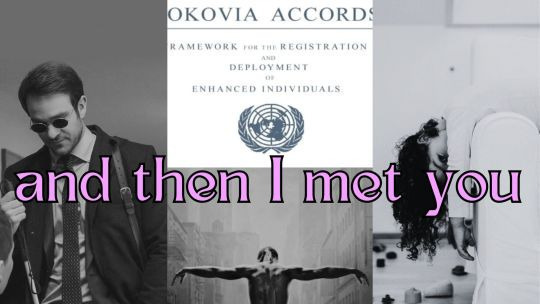
|| Trigger Warning: Graphic Descriptions Body Horror & Death Regarding Unnamed Children ||
All your life you have heard that there is a beauty in chaos, and while you do agree with this, you also find there is a beauty in organization.
You like taking all the chaos and putting it into categories. You like sorting the details and finding the mysteries that need to be unraveled. You think it must be similar to how clever people feel when they solve a riddle or a puzzle, but you aren’t running in circles with philosophical thoughts - you are analyzing what is already available and coming to a conclusion.
It is still all chaos, because everything is always chaos, but it is organized into a way that makes sense.
And Matt’s stolen duffel bag, when first unzipped and inspected, was full of chaos.
You, Foggy, and Karen quickly got to work looking over the different papers and forming different stacks based upon agreed parameters.
It became clear Matt’s guess that he had found some sort of laboratory was correct. The papers all appeared to be results of different medical tests, though at first glance, the three of you could not decipher for what.
But deciphering wasn’t needed at that moment, so it didn’t matter, and once everything was spread neatly across the dining table, the next step of your beloved process began.
Foggy gave each pile a designation and then the three of you began labeling each paper in the top corner.
A1. A2. A3. A4.
B1. B2. B3. B4.
All your analyzing would be useless if you couldn’t source your data, and it was quickly clear your little group all shared the same brain cell when it came to this idea.
While you worked at the table, Matt and Jessica sat on the floor by the couches, marking up a map. You caught snippets of the conversation - this bit of evidence was heard in that alley, to get to a certain tunnel system you had to go through such and such warehouse. It was fascinating to know that Matt had memorized nearly every square inch of Hell’s Kitchen - even the parts you didn’t know existed - and it was equally amazing that Jessica knew just as much.
After hearing them talk, it left you wondering if Frank had the same knowledge, but you would leave that question for another time. He had been assigned to the two thumb drives that had been in the duffel bag. You had furiously taken mental notes as he had grumpily explained to Matt the little devices couldn’t just be plugged into a computer. They could have malware on them or trigger tracking or something equally devious and needed to be inserted into a clean laptop that couldn’t connect to the internet. That way, if the laptop tried to send a signal or became a brick, there would be nothing lost.
Since neither you nor Matt happened to have a spare laptop laying around, Frank went to go procure one.
That was about half an hour ago and now you are well into your third Foggy-assigned task - highlighting any identifying information in yellow. There’s nothing easy like names or addresses listed out, but you noticed a pattern for patient labels and have determined there are at least five.
As you jot down that Patient 031517DVA also appears on page D4 in your notebook, you find you are enjoying yourself. This isn’t exactly what you imagined when Matt talked about inviting everyone over to review what he had found, but you think it is nice. Knowing that Matt isn’t out there running around without any sort of plan soothes your nerves and seeing that he is putting in the time and thought into his next actions makes you trust he knows what he is doing.
No one wants a shady underground lab in their neighborhood, but you need to make sure they are actually shady first and not some weird fringe group researching an unknown breed of sewer rat.
The effort going into helping Matt with this task makes your fondness of Foggy, Karen, and Frank grow even more - and gives you a fondness for Jessica. Everyone is serious about their task, and extremely thorough, and you want them to see you in the same light. You know this is not a game and you refuse to let your part in the research be the weak link.
As you go to the next row of numbers to examine, you catch some movement in the corner of your eye. You turn your head and watch with a soft smile as your daughter emerges from Matt’s bedroom, clad in her mouse-onesie pajamas. Her sleep mask is pulled down around her neck and she looks upset, but she’s not crying, so you don’t jump to run to her. You let her make her own decisions as she sleepily looks between you and her father and you can’t help but to mentally crow a bit as she starts shuffling towards you, her little mouse-tail trailing behind her.
Everyone’s attention is on you as Minnie lifts up her arms to be picked up once she’s within a foot of you. You dutifully scoop her up and put her on your lap, fixing her hood and mouse-ears as you do.
“Is everything okay, sweetheart? Did something wake you up?”
She nods, then flops herself against your chest, mumbling out, “There’s monsters.”
You begin to gently rub her back, hoping to soothe her worries as you confirm, “there’s monsters?”
Again, her head bobs up and down before she nuzzles into your neck, trying to hide herself. Across the room, Matt is up and making his way towards you, but it is Foggy who speaks up next.
“Are they silly monsters or scary monsters?”
You smile at the question as Minnie ponders it - her little lips purse against your neck and you feel her breath against your skin as she silently repeats the words. She decides on ‘scary’ - replying in a timid voice as Matt takes his place behind you, sliding his hands onto your shoulders.
“Do you want me to help you tell them to go away?” you ask, having packed your bottle of Monster Repellent for just this cause. Little fists clutch tightly at your shirt as Mouse shakes her head and you give a soft hum in thought. “Do you want Daddy to go scare them off?”
You are sure Matt would run outside to chase away a stray cat or hungry raccoon if his princess wished for it, but she shakes her head against you, so you guess Matt will be staying inside.
“How about we make the monsters silly instead of scary?” is Karen’s suggestion, and like the others, it falls flat.
You consider offering to read some stories, but Matt startles you from your thoughts by sliding his hands down your arms to get to his daughter. He gently urges her to let go of you before transferring her to his arms and bundling her close. She absolutely clings to him, looking so tiny against his broad shoulders.
“I got this,” he says, his voice barely above a whisper before he turns and starts making his way back to the bedroom. As you watch him walk away, he buries his nose into her hood, and he begins to rock with each step. The itty bitty fist you can still see tightens around his t-shirt and your heart yearns to follow your family, but you know this is a Daddy-Daughter moment and you need to stay seated.
You were worried about Minnie getting scared over sleeping in a new place - there’s so many new and different noises but you trust Matt to help her interpet everything. He’s already done such an amazing job of it in day-to-day life and you know he’ll explain away all her monsters and let her know she is safe.
Considering the company she is starting to keep she is probably the safest little girl in New York. No monsters would dare to lurk in her shadows less they want to face the wrath of the Devil.
You know that this little group you are becoming a part of would join you in jumping in front of a bullet for your daughter and you are pretty sure even her newest best friend - Max the Dog - would not hesitate to bare his teeth if someone upset her.
She deserves nothing less and it makes your heart soar that she is so thoroughly adored.
Now that her research partner is on another important assignment, Jessica gets up off the floor and strolls over to the table, “anything interesting?”
“Maybe if we were scientists instead of lawyers,” Foggy replies warily, dropping his pink highlighter in favor of nursing his beer, “and knew what any of these numbers meant. We’re going to spend all night looking up these test numbers and hoping they are real. I mean, look at this,” he motions to the paper he is currently working on. “What the hell is D22S1045? And why is the result 15?”
Jessica takes one look at the paper before scrunching up her nose and blandly stating, “It’s a DNA marker. Haven’t you ever seen a paternity test?”
Foggy’s face goes slack for a moment before he is huffing, “Not since college when we had to study paternity suits, and they looked nothing like this! They were like dots we had to match, not numbers!” He uses his beer to point to you, “did yours look like this?”
Your cheeks heat up at the question and you duck your head, hating all the attention is on you with such a personal question. “No. No, mine didn’t…we just received a letter with the results. Not the data.”
“So, they are doing DNA and blood tests?” Karen asks, taking over the conversation and directing it back to Jessica. “And comparing them with each other. Could they be looking for relationships between them?”
“I’m not a fucking doctor,” is the reply she gets, but Jessica picks up the paper to examine it more closely either way. “But none of these match. The numbers have to be the same for a parental match, but that might not be what they are looking for. Just because it looks like a paternity test doesn’t mean it is one. DNA markers are used in a lot of shit.”
“It might not be human,” you add quietly. “Matt said the lab smelled of human blood, but we don’t know that these tests are on humans. There’s no dates on these, so they could be years old.”
Karen whips out her phone and is typing away before you are done talking, “What was that DNA marker, Fog?”
Foggy repeats the string of numbers and letters and you watch Karen’s eyes scan her screen.
“It’s human,” she states after a long, tense moment. The scowl Jessica gives is near legendary.
“Great, so we have a bunch of assholes in abandoned tunnels running tests on people.”
“That sounds both sanitary and humane,” Foggy grumbles before throwing back the rest of his beer.
“OSHA and FDA approved,” you add sarcastically and that earns you a smile from Karen. She tucks a strand of hair behind her ear before she guides you all back on track.
“We still have no idea what they are looking for, though. This could be cancer research for all we know - we are still at square one.”
“One point five,” Foggy argues, “we confirmed it’s human.”
“We don’t know what the tests are looking for,” Karen repeats, ignoring him, “and I don’t think looking up the significance of each DNA marker is going to do us much good. Can you and Matt go back to the lab and look around?”
As the clear recipient of the question, Jessica huffs then turns away from the table and goes right to the bottle of Macallan Matt keeps on top of his fridge. She pops off the lid, taking a long drink of it before answering.
“That was the plan, but I’m betting it’s going to be sprayed with bleach after knowing Devil-boy was poking around. It’s not like we will get much, not that there was shit to get beforehand.”
“So, we have no who, no why, and no where,” Foggy points out. “We are doing great.”
The joy you had gotten from trying to organize the chaos of paperwork evaporates and you sink down into your chair a little. Would continuing to highlight and document be useful or was this all for naught? The rational part of your brain told you to keep going, because it was better to have it done and not need it then to need it later and it still be a mess of paperwork.
“We’ve just started, Fog, of course we have nothing,” Karen says, rolling her eyes a bit as she does. “Did you expect them to write their plans in gel pens and leave them lying around?”
“I mean, that would be useful.”
You roll your lip between your teeth, thinking that Karen is right. You don’t have much, and you’ve only just started - of course things look pessimistic. While Karen and Foggy begin to banter back and forth about the use of gel pens in a professional setting and Jessica finishes off Matt’s whisky, you let your mind wander around the facts of the case.
Someone is out there running medical tests in a gross underground lab, probably trying to hide what they are doing. To do a lot of tests, they probably needed lab equipment, and a few years ago you would have said to follow that trail, but with all the advancements in technology, a machine to run DNA tests on probably only cost a few hundred dollars and was compact enough to move easily. Generators could keep people off the grid and there were enough tunnels under the city that years could be spent exploring them. Everything they would need could be ordered offline, and thus, was untraceable to you.
The only solid clues you had were what Matt had come home with, so you needed to keep digging there and hope that the thumb drives would contain something more useful.
So, you pick yourself back up, grab your highlighter, and get back to work.
Soon enough, Foggy and Karen pick their highlighters back up as well, and Jessica takes up a spot on the couch, putting her feet up and getting out her phone to tap at. The mood is much more somber, but you feel the same determination to find answers that is in you coming off of everyone else as well.
You don’t pay attention to the passage of time, but it is not long after you grab the final stack of papers to comb through that Matt slips out of the bedroom and closes the door behind him.
He starts towards the dining table only to stop by the couch, tilting his head towards Jessica, “That bottle was a gift from Foggy’s dad.”
“Boo-hoo, cry me a fucking river, Murdock.”
Despite the venom in Jessica’s voice, Matt chuckles and finishes making his way to you.
His hands once again find your shoulders and he begins rubbing them, digging his thumbs into just the right spot as he begins his Minnie-update.
“Someone with a really nice sound system is having a horror movie marathon. She was actually hearing monsters.”
“My poor baby,” you instantly coo, your heart breaking for your little one. “Did you tell her it was just a movie?”
Matt hums in affirmation, “That doesn’t help with the noise, though. We walked through turning things off and found something to work as white noise. It’s still hard for her to do it with new sounds, especially so tired, but she’s a quick learner.”
“How long did it take you to learn all that stuff,” Foggy asks, interest clear in his eyes. Karen puts her pen down as well so she can get the gossip.
“I don’t know, years? It didn’t come naturally to me like it does with her - I would train for hours to be able to pinpoint something, but she can do it pretty easily. I mean, she can’t tell me exact distance because she’s four and doesn’t know what that means, but she can point and say if it’s close or far.” You can feel Matt practically puff up with Pride over his baby girl. “She’s learning inorganic versus organic sounds now. She can tell if a loud banging is someone hitting something or if something just fell over. The other day she told me it was the wind making the window shake, because she couldn’t hear any other noises around the window.”
You smile at the story, having a feeling Matt is going to start going on about all the declarations Minnie had made during the storm and you don’t mind at all.
“So, she’s as good as you?” Karen teases and you know Matt is just beaming.
“Better. She can actually read a sign.”
Foggy barks with laughter while you and Karen have to cover your mouths to not giggle.
Once it subsides, you tilt your head back so you can look up at your daughter’s oh so loving father, bumping against his abdomen as you do, “is she down?”
He gives another positive hum, “In a nice deep sleep. Frank’s on his way back up and I wanted her out before he got here.”
You don’t know if that is from Matt wanting to rejoin the group to know what is on the thumb drives or if it is from him not wanting Minnie to get excited over Frank, but you are thankful she’s conked out either way. The thought of her hearing all your discussions about what lurks in the darkness of the city makes your stomach turn.
She doesn’t need more monsters to imagine.
You thank Matt while reaching up to rub one of his arms - letting yourself give him a small bit of affection. You ignore the look Karen is giving you in favor of making sure Matt is all caught up.
“I take it you heard everything?”
He sighs deeply through his nose, and you take that as a ‘yes’. He confirms with his words.
“Human testing with government trained agents isn’t what I was hoping we would find.”
“I was personally hoping for research on the mutant alligators in the sewers,” Foggy says as he gets up to go towards the kitchen, probably for another beer. “You know the ones they flush down the toilets.”
“That’s a myth, Fog.”
“Look, with everything else that goes on in the world - weird aliens and giant green men - let me believe in my sewer gators, Murdock. They make me happy.”
“With everything that Stark and Roxon dumped in the waters, I wouldn’t be surprised,” Karen muses, resting her chin in her hand, “I mean, Matt got superpowers from something getting in his eyes. If a rat ate something that was contaminated, it could have gotten super senses as well.”
You raise your brows up at the idea, a smile coming to your face, “a crime fighting rat?”
“A crime fighting rat that is a ninja,” Foggy chimes, a wide grin on his face and it sends you into giggles.
“How would a rat even learn martial arts?” Matt counters, “There’s not a rodent karate school he could spy on.”
“I don’t know Matt, how did you learn ka-ra-te,” Foggy emphasizes the word to make it sound more mystical. “He would learn from a secret ninja rat clan.”
“What the fuck are you guys talking about?” Jessica asks, looking over her shoulder at the dining table, disgust and confusion clear on her face.
You and Karen erupt into more laughter while Foggy just grins like he won the world cup as he returns to his seat. Matt gives your shoulders a firm squeeze before letting go and pulling away. He disappears into the narrow passage that is his hallway, and you hear the front door open. Heavy boots signal Frank’s reappearance, and when he and Matt come back around the corner, you offer a small smile.
The Punisher holds up a clunky looking laptop, straight from your middle school years, “Got it.”
“Does that thing even work?” Foggy asks, eyes narrowing in scrutiny. You trust Frank, but the question is valid - if you saw that in a Goodwill, you would doubt it would even turn on.
“Of course it works,” Frank scoffs as he delivers the device to Karen. She instantly opens it up to get it started. “Old body, new hardware. Got it built just for this type of shit.”
Foggy’s lips twitch and you wonder if he wants to say something but is holding his tongue. Jessica joins the table as Matt once again returns to standing behind you. His hands find your shoulders like they are drawn to them, and you wonder if he can’t help but want to touch you. It makes you feel special and wanted and your belly stirs with a certain type of warmth.
Everyone’s focus is on Karen as she works - the laptop boots up and she fiddles with the first thumb drive until it is ready to be inserted. It feels like you all are holding your breath as she finally plugs it in. You expect there to be a password, but apparently there is not, as she just clicks away.
“There’s two files,” she narrates. “One labeled 082616DUK and one labeled 121417BNY.”
You instantly recognize the first designation and push your notebook towards Karen, trying to not sound eager as you tell her, “The DUK one is in our files. Can we look at that first?”
Her face lights up at the prospect of a connection and selects the requested file, “There’s five pictures. Hold on, let me bring them u- Oh my God.”
The little color in her face drains as a horrified expression takes over and her hand shoots up to cover her mouth. You and Froggy scramble up out of your seats while Frank and Jessica crowd around Karen to look at the screen. Matt stays where he is, tilting his head just slightly.
When you see what is in the file, you wish you had stayed under Matt’s hands.
The neatly severed head of a boy stares back at you with blank milky eyes, sitting on an examine table. His hair has been shaved away and there is an incision line around his skull that makes it clear someone has probably removed his brain. His mouth is open in a silent scream, showing off that he still had his baby teeth and that someone has taken his tongue.
You want to throw up and you want to turn away, but you can’t. You can’t look away from this poor child who someone has so thoroughly defiled. Who had done this to this boy and why? You wanted to shake them and scream and demand to know what could possibly possess someone to do this to a baby? Because this was someone’s baby - someone’s little boy - and someone had taken him and ruined him.
You don’t know how she manages it, but Karen brings up the next image and it fills you with just as much disgust and anger.
It is that of a tiny hand with its fingers forcibly splayed, stuck with pins to keep it that way. The tips are bulbous and round, different to anything you’ve seen on a human before, and between each digit, there was a thin stretch of skin connecting them, much like the webbing of a duck’s foot. Like the head, the hand has been surgically removed from the rest of the body, and it isn’t hard to determine they go to the same person.
The next image is of the head again but turned to be facing the left and pre-removal of the tongue, as the appendage is pulled and stretched from the mouth with a pair of forceps. The muscle is an odd shade of purple and coated with some sort of liquidy-white residue, but that is not what is unique about it. The boy’s tongue doesn’t just peek out of his mouth - it extends across the table almost three feet, if the tape measurer under it is to be believed.
You need to turn away after that and to no surprise, Matt is instantly by your side, wrapping you up in his arms and guiding your head to his neck. “He’s just a baby,” you whisper in horror as you cling to him, not understanding how someone could be so cruel. Even if he had died naturally, there was no reason to treat him like that in death.
“Did they…” Froggy starts, his voice low and quivering and you don’t know if it's from rage or grief, “Did they make him a frog? Did they mix this kid with a fucking frog?”
“No,” Frank replies, not hiding how he is feeling at all. The fury is clear in his voice. “They did it because he was like that.”
“What’s the other file?” Jessica demands and part of you doesn’t want to know. You bury yourself more into Matt and you listen to Karen click away at the track pad.
Matt’s arms tighten around you and you can’t imagine what he is thinking. No one has said out loud what the images show, and he has not asked - but he must know it isn’t good. He’s gone tense under you, like he’s ready to jump into action and rip someone apart with his hands.
And you want him to. You want Matt to find whoever did this and make them pay. You want him to punish those who hurt the child in the photos, the people who ran tests on him.
You want to help Matt find who did this and for him to make sure they can never hurt anyone ever again.
“She’s…she’s got a beak.” Karen says slowly after a few moments, and you can’t bear to look at another autopsy photo. You hide yourself more against Matt, not at all ashamed of your choice.
“She’s Enhanced,” is Jessica’s reply, almost blank with stifled emotion.
“She’s a kid. They are hunting Enhanced kids.”
“Why?” Foggy questions, sounding wet, like he’s starting to tear up. You don’t blame him in any way. “Why would they do that?”
Under you, the Devil finally speaks, his voice low and eerily calm, “it doesn’t matter why. We are going to find them, and we are going to stop them.”
---
:) :) :)
---
@two-unbeatable-beaters @kiwwia-wiwwia @1988-fiend @xblueriddlex @loves0phelia @ninacotte @lovelyygirl8 @littlenosoul @ednaaa-04 @astridstark13 @hashcakes
@lovingkryptonitehideout @moongirlgodness @soocore @bluestuesday @midnightwonderlan
@starry-night-20 @rebeccapineapple @writtenbyred @cherrypie5 @capswife @silvercharacterchaos @resting-confused-face
@Specialagentjackbauer @yarrystyleeza @ofmusesandsecrets @buckyssugarchick
@the-devils-angel @savvyreyes4587 @diasnohibng @blobygree18 @givemylovetoall
@midnightreids @cloudroomblog @yeonalie @thychuvaluswife
@petrovafire39 @ghostindeath @roxytheimmortal
@allllium @waywardcrow @thatkindofgurl @waywardxrhea
@anehkael @akilatwt @lostinthefantasies @reluctanthalfwayoptimism @ethereal-blaze
@nennia-2000 @seasonofthenerd @abucketofweird @mattmurdockstateofmind @imagineswritersblog @hazelhavoc @smile-child-13 @allst4rsfall @hashcakes @kezibear @mapleaye @sammanna @gamingfeline @moon-glades @nightwitherspring @phoenix666stuff @dare-devil
@ladyoflynx @hobiebrowns-wife @sarcasm-n-insomnia @lillycore
@dorothleah @mattmurdocksstarlight @mars-on-vinyl @mywellspringoflife @sleepdeprived-barelyalive @simmilarly @soupyspence @darkened-writer @akila-twt
@murc0ckmurc0ck @groovycass @sumo-b98 @just3rowsing @tongueofcat @zoom1374
@theclassicvinyldragon @aoi-targaryen @lunaticgurly @nikitawolfxo @shireentapestry @snakevyro @yondiii @echos-muses @honeybug-victoria @the-bisaster @ristare
@mrs-bellingham @eugene-emt-roe @cometenthusiast @stevenknightmarc @yes-im-your-mom @hunnybelha @actorinfluence @capbrie @prowlingforfood @jupitervenusearthmars
@mayp11-blog @danzer8705 @thinking-at-dusk @remuslupinwifee @akila-twt @nommingonfood @mattmurdocks6thscaleapartment @dil3mma @allllium
#soulie writes#fanfiction#and then i met you#matt murdock x reader#daredevil#matt murdock x you#R rated chapter be warned
226 notes
·
View notes
Text
THE 25TH HOUR | O8
“𝐃𝐄𝐂𝐀𝐘𝐈𝐍𝐆 𝐓𝐑𝐔𝐓𝐇𝐒”

"Your coffee is exactly the way you like it, though you do not remember having a preference over it, nor knowing Agent Min's. Just like you don't remember the coffee shop, or the barista. Or how, apparently, certain phrases trigger certain protocols."

next | index
— chapter details
word count: 5,4k
content: coffee details, sugar slander, yoongi hiding the softness (i see u mf), him leaving in the worst moment possible (oh no can you believe that), a barista thinking he's john wick and yoongi showing him he's indeed not (why am i laughing at this i'm so funny), idk fleeing, superpowers, golden tendrils/tentacles/traces and they're sensitive bc i'm a horny slut who loves drama, yoongi explaining his abilities and basically both of them being somewhat stranded.

— author’s note
OKAY OKAY OKAY—wow. phew.
Lemme just say I had to speed write this chapter like I was being chased by CHRONOS itself because I was NOT prepared for y’all to hit the chapter goals in like… two days. TWO. DAYS. Both on Wattpad and Tumblr. Kinda insane honestly but also like… slay Kiki Nation, we are so back.
This was a severe underestimation on my part and it 100% reflects in the goal numbers I set this round. Don’t look at me like that. This is entirely your doing.
NOW. As for this chapter: WOAH. I was so itchy to finally get into some action-packed scenes!!! I know it’s not a full-blown Marvel throwdown or anything but ughhhh I love the way it’s parried with uncovering new truths, a little sprinkling of Yoongi’s abilities, and just the faintest nod at Noma’s. We’re getting there, babies. We’re cooking with unstable temporal gas.
Sci-fi + superpowers = my drug. Inject it directly into my brainstem. This fic is honestly just me going full feral in my favorite genre and I love that you’re all just vibing with the chaos.
And hey—just a heads up—those golden traces / tendrils / tentacles / whatever-the-fuck you wanna call them? Yeah. They’re important. Not just plot-wise.
Oh no. We’re going smut-wards. You remember that little detail about them being sensitive? YEAH. Narrative seed. Planted. You’re welcome, you horny-ass goblins. I love your deranged asses because they are as feral as mine and I respect that.
Anyway. I’m gonna make that man suffer through overstimulation and there’s NOTHING you can do to stop me. Whoops. Who said that??
Godspeed and love. <3

— read on
ao3
wattpad

You’ve never registered an aversion to coffee.
Analysis confirms your preference: black, minimal dilution via milk, zero sweeteners. Sugar introduces an artificial variable, a taste profile your palate rejects as inefficient data.
The cup sits between your hands now, untouched. Heat radiates outwards, a minor thermal signature registering in your system. You stare into the dark liquid, a reflective surface showing nothing but distorted ceiling lights. Your mind searches for a focal point, a problem to solve, but the what remains elusive, fragmented.
Beside you, Agent Min occupies the adjacent stool. His presence is a known variable, yet the proximity registers as… different. Static cling without the static.
His coffee mirrors yours in its lack of sugar, but deviates in the absence of milk. Plain black. Stark. Your internal database flags this information, yet registers no 'new entry' timestamp. It’s data already logged, sourced from… where?
The query returns a null set.
Error. File not found.
“Good?”
The query comes from him. Low frequency, minimal inflection. You lift your gaze, meeting his across the short distance. Dark eyes, partially obscured by mint smudges of hair that have fallen across his forehead.
Analysis identifies a lack of direct eye contact, his focus aimed somewhere near your left temple.
A defensive posture? Or observational?
You tilt your head, a minor adjustment of 15 degrees. Querying his query.
The corner of his mouth flickers. A micro-expression, barely perceptible, suppressed almost instantly. He’s withholding an upward curve, a smile response.
Why?
“I mean you,” he clarifies, voice maintaining its low, even tone. “Not the coffee.”
You redirect your focus to the cup. The brown surface ripples slightly as you shift your weight. You deliberately defocus your vision, blurring the edges of the ceramic rim.
Unconscious action.
Flagged for later analysis.
“Yeah, just…” The sentence terminates prematurely. Insufficient data to complete the thought. Or perhaps, excess data causing system overload.
He mirrors your earlier gesture, head tilting towards you. An eyebrow arches. A non-verbal prompt for continuation. Standard interrogation technique.
“I knew Robin.” The words emerge, low volume, clinical detachment coating the raw data point.
He nods once. A slow, measured movement. No verbal response. He allows the silence to expand, granting you control over the data flow.
“And now he’s gone.” You complete the statement.
Flat delivery. Fact confirmed.
His gaze drops to his own cup. He lifts it, takes a sip. The motion is fluid, economical. He places the cup back down without a sound. Four seconds pass. Five.
“I got him erased.” The statement escapes as a whisper, approximately 17 decibels.
A conclusion reached through flawed logic, yet carrying an unexpected physical weight. Something constricts within your chest cavity, pressure.
His response is immediate. No processing delay.
“No.”
The word is rough, textured like sandpaper against concrete. A rasp that cuts through the low hum.
“CHRONOS got him erased.” He pauses, intake of breath audible. “That’s what they do.”
"I mentioned the temporal anomaly to him." You mutter, the unidentified strain expanding behind your sternum. "Probability suggests that's why they targeted him."
"They were already watching him," he says, voice calibrated to exactly 40 decibels. "Your conversation may have accelerated their timeline, but he was already flagged."
You process this new data point, running probability calculations against known variables.
"How can you be certain?"
His eyes meet yours—pupil dilation increasing by 7.3% in the 0.7 seconds of direct contact.
"Because I've been tracking their erasure patterns for longer than you've been alive."
The statement contains multiple logical inconsistencies.
Agent Min does not look significantly older than you.
Yet your temporal analysis centers don't flag it as a falsehood.
Your glance moves back to the cup.
"Robin kept succulents on his desk," you say, the information surfacing without clear relevance markers. "Three of them. Arranged by height. He watered them every Tuesday at 14:27."
Yoongi's face produces some series of micro-adjustments in 17 distinct facial muscles that combine to form something your pattern recognition identifies as... compassion?
The classification feels incorrect, but alternatives rank lower in probability.
"You're processing grief," he observes, voice modulating to a softer cadence. "It's normal."
The diagnosis feels foreign. Incorrect. Your emotional processing centers operate at 98.7% efficiency. You would recognize grief.
Wouldn't you?
"I barely knew him," you counter. "We shared 17 lunch periods over 4.7 months. Total interaction time: 23.8 hours. Insufficient for meaningful emotional attachment."
Yoongi takes another sip of his coffee. The liquid level decreases by exactly 12 milliliters.
"Grief isn't always logical," he says after 2.3 seconds of silence. "Sometimes it's just... human."
The cadence in his last word triggers some unexpected response in you.
"I'm not experiencing grief," you insist. "I'm experiencing statistical anomalies in my cognitive processing."
His eyes meet yours again—0.9 seconds of contact that somehow feels heavier than its temporal parameters suggest.
"Call it whatever you need to. The result is the same."
Your fingers adjust on the cup again—pressure decreasing by 0.2 kilograms as your muscles unconsciously respond to his voice.
"What is the statistical probability that my conversation with Robin directly caused his erasure?"
Yoongi's expression darkens—brow lowering by 0.4 centimeters, jaw tensing with 31% more force.
"You're looking for a percentage to quantify your guilt," he observes, voice edged. "It doesn't work that way."
"Everything works that way," you argue. "Reality is quantifiable. Causality is measurable. Effect follows cause at precisely calculable intervals."
"Not in the 25th hour. Not with CHRONOS."
Silence spreads as his thumb traces the rim of his cup-three precise rotations counterclockwise. Then, he speaks again, needing to make a point.
"Consistency matters now more than ever. CHRONOS is auditing behavioral patterns with 62% increased scrutiny since last quarter."
You frown. "Source?"
"Erratic temporal enforcement." His finger taps the ceramic once—sharp, percussive. "Fourteen percent spike in memory wipes. Thirty-three percent decrease in Outlier survival rates post-detection."
The numbers land like ice chips down your spine. "Correlation doesn't imply causation."
His eyes narrow by 0.3 millimeters. "You think they're redecorating parks for aesthetic purposes?"
You ignore the rhetorical jab. "Recommended behavioral adjustments?"
"Normalcy. No deviations from established routines. No unscheduled interactions. No..."
His gaze flicks to your hands.
“...idle curiosity."
You follow his line of sight.
Your fingers have been tracing infinity symbols in condensation on the table.
A subconscious pattern emerging at 2.7-second intervals.
"Noted."
You wipe the moisture away with a napkin, friction coefficient registering 0.4 higher than standard paper stock.
"They're cross-referencing biometrics with temporal signatures now. Elevated heart rate during routine scans triggers immediate audits."
Your pulse spikes by 11.2 bpm at the implication. "You're suggesting emotional suppression."
"I'm suggesting survival. Your body can't afford inconvenient truths right now."
The phrase 'inconvenient truths' lodges in your cortex, sparking 37 simultaneous neural queries.
All return access-denied.
"Define 'normalcy' parameters."
"Wake at 06:00. Work until 18:30. Consume 427 calories at designated intervals. Report all temporal irregularities except the ones we cause."
"Compliance seems..." You search for the optimal term. "...counterintuitive to resistance efforts."
“You think rebellion looks like fireworks and manifesto drops?" Leather creaks as he leans closer, mint and ozone sharpening the air between you. "Real resistance happens in the microseconds they don't monitor."
Your retinas capture the exact moment his pupils dilate—3.2% expansion correlating with proximity increase.
"Such as?"
"The 25th hour. The only time they can't see us."
Your watch beeps softly—temporal variance: 0.89%.
He pulls back instantly, posture reset to neutral. "Stick to the numbers. The patterns. The lies they've programmed you to live."
The coffee turns bitter on your tongue, pH shifting by 0.2.
"And you?"
“I'll be the ghost in their machine."
Ghost.
The word settles in your chest, impossibly making it warmer.
Then, the lights flicker—a couple times—as CHRONOS agents pass outside the window. Their shadows stretch across the floor in elongated distortions, limbs warped by the glass's refractive index.
You count their footsteps.
He counts your breaths.
A soft exhale from his lips—a controlled release of 1.2 liters of air over 2.4 seconds.
Rising from the stool, he stretches his neck 37 degrees to the left, then 42 degrees right. The vertebrae produce three distinct clicks at frequencies between 73 and 81 hertz.
His cup sits empty. Yours remains 73% full.
That same suppressed curve at the corner of his mouth does a reappearance.
Your pattern recognition flags it as the third occurrence of this specific micro-expression in the past 18 minutes.
“I need to use the restroom.” His statement is direct, efficient. “Wait here.”
You nod once—a 15-degree downward tilt followed by an equivalent upward correction. Optimal response to a simple directive.
He moves 1.7 meters toward the back of the establishment before pivoting 170 degrees. His eyebrows lift by 0.4 centimeters, creating three distinct lines across his forehead.
“You’ll be okay?”
The question registers as anomalous. Its premise suggests a concern disproportionate to the circumstances. Your brow furrows, creating a 0.3-centimeter depression between your eyebrows.
He shakes his head, dismissing the moment, and disappears behind the door marked RESTROOM—white letters, slightly chipped, 7.2 degrees off center.
You pivot on the stool, body angled toward the counter.
The coffee sits there, cooling. You sip. It’s gone tepid. Your thumb traces the rim, mapping the circumference for the third time.
The bartender approaches. Male, mid-thirties, dark hair, clean apron. Smile at 65% intensity.
“Not a fan of the coffee?” he asks, voice pitched for casual friendliness. “You’ve been staring at it longer than drinking.”
You blink twice. Processing. “No, it’s fine.”
He leans in, elbows on the counter. “You sure? Most people ask for sugar. Or something sweet.”
You shake your head. “I don’t like sweeteners. They distort the baseline flavor profile.”
He laughs, easy. “That’s… specific.”
His gaze lingers, searching for something.
“You come here often? I don’t recognize you.”
You hesitate, brain skipping. “Not that I remember.”
The words fall out, unfiltered. He goes still. Smile vanishes. His hand drops below the counter—movement too smooth.
Cold metal presses to your temple. Soft click.
You catalog the sensation.
Barrel diameter: 9mm.
Temperature: room.
Pressure: firm, not shaking.
His voice drops, all pretense gone. “Don’t move. Don’t speak.”
You comply.
Data input: threat detected.
Output: unknown.
Your retinal sensors register gold first—erratic sparks at 11 o'clock, 43 centimeters from your focal point.
The barista's weapon hand undergoes rapid cellular decay: skin desiccating at 3.7 millimeters per second, muscle tissue liquefying with 92% efficiency. His scream measures 114 decibels—pain response authentic, but temporal signature reveals 0.8-second delay.
Agent Min's grip materializes around your wrist before the decay reaches radial artery. His fingers burn at 39.1°C, golden threads weaving through his leather gloves. The world blurs—not from speed, but temporal interference.
Your internal chronometer confirms: local time dilation of 47%.
"Move." The command vibrates at 87 Hz, bypassing auditory processing to embed directly in your motor cortex.
Your legs comply before conscious thought engages. Adrenaline spikes—17.3% above baseline. The cafe exits warp as you pass, doorframes appearing to bend at 12-degree angles—an optical illusion caused by the temporal distortion field surrounding you.
CHRONOS agents materialize in peripheral vision, their movements unnaturally segmented—3.1 frames per second versus standard 24. Their comms chatter fractures into your awareness:
"—emporal breach Sector 4-Alpha—"
"—arget exhibits Reality Shifter signatures—"
"—containment protocol Theta-7 authorized—"
Yoongi pivots 170 degrees, dragging you into an alley where air molecules vibrate at 0.7x normal frequency. His free hand glows faintly gold, pressed against the brick wall. Mortar ages backward then forward in precise spiral patterns—2.3 revolutions per second, creating a passageway exactly 0.9 meters wide.
"Don't breathe," he warns as you pass through particulate matter suspended in his temporal field.
Your lungs register 14% oxygen decrease.
Insufficient for hypoxia.
Sufficient for discomfort.
The alley deposits you onto a street where Agent Min(?) has slowed time by 23%. Pedestrians move at imperceptible rates, their coffee cups appearing frozen at 37-degree angles. His temporal manipulation leaves gold afterimages—3.2-second persistence in your peripheral vision.
Your Chrono-Sync Watch beeps erratically:
TEMPORAL VARIANCE: 4.89%
ANOMALY DETECTED
His grip tightens—42.7 kilograms of pressure now, necessary to anchor you against increasing temporal distortion. Without his stabilizing touch, you assume your untrained body would suffer severe temporal drag.
"Focus on my voice," he commands, words layered with harmonic frequencies that stabilize your inner ear fluid against the disorienting effects of his temporal field.
CHRONOS drones breach the time dilation field behind you, their propulsion systems screeching at 17 kHz—the exact resonant frequency that makes your temples protest.
They're designed to track and pursue through temporal distortions. You know this from your training, what they taught you. Or at least, what they wanted you to be taught.
But Yoongi never looks back; not even once.

Nature’s lumbar support leaves much to be desired.
The wall at your back is jagged, scraping through your shirt, stone biting into skin. Yoongi’s breath saws out next to you, sharp, furious. He rounds on you, eyes wild, voice pitched higher than baseline.
"What the fuck did you do?"
The question isn't a question—it’s an accusation wrapped in 87 decibels of controlled fury. You straighten 2.3 centimeters, ignoring how the rock tears at your jacket.
“I answered his query within established social parameters."
His laugh is all sharp edges. "Parameters? You told a CHRONOS informant you didn't remember him!"
"Statistical probability suggested—"
"Probability?" He steps into your space, mint and ozone overpowering the cave's damp musk. "They've activated civilian reporting protocols! That bartender was required to log every customer interaction!"
Your pulse spikes-+18bpm. "Unforeseen variable. You didn't brief me on—"
"I literally just said don't deviate from normalcy!" The wall cracks behind him, hairline fractures spreading at 3mm/second. "Normal people don't have memory gaps about coffee shops!"
You catalog the wall damage—microcrystalline structure failure inconsistent with human strength.
Fascinating.
New data point: Agent Min's capabilities exceed known parameters.
"My response was logically sound," you counter. "Approximately 72% of humans experience—"
"Logically suicidal." Gold sparks dance in his irises now. "They train those informants to flag exactly that phrase."
The revelation triggers 23 simultaneous neural queries.
"Why would 'not that I remember' trigger—"
"Because Outliers say it when their memories glitch!" He's closer now, 47cm instead of 72. "Basic fucking tradecraft, Noma."
You flinch at the nickname. "You expect me to intuit unpublished surveillance tactics?"
"I expect you to listen when I say CHRONOS is hunting us." The gold intensifies, threads weaving through his clenched fists. "That man wasn't armed until you turned him into a threat."
"Correlation fallacy." Your voice drops to 19dB. "You lack evidence that—"
The cave wall explodes.
Not literally—just Yoongi's fist connecting with stone 3.2cm from your head. Dust cascades downward as he withdraws his hand, skin unmarred.
"Evidence?" His breath ghosts across your lips, warmer than human biology allows. "You think decay patterns manifest spontaneously?"
Realization crystallizes.
The bartender's rotting hand. The gold threads. The temporal distortion.
Your eyes narrow. "You altered his cellular decay rate."
"To save your statistically suicidal ass."
"Without consent."
"Without options.”
The standoff lasts 4.7 seconds.
"You're an anomaly," he growls. "Stop acting like one."
"Variables require data." You match his glare. "Which you hoard like a fucking dragon."
His hands rake through mint hair, leaving it standing at precisely 47-degree angles.
"Because I have no other fucking choice!" The words explode from him, raw and jagged. "Every piece of information I give you is another potential trigger. Another way for CHRONOS to find you. To erase you. Again."
That word. ‘Again’. He keeps saying it, like it’s something he can’t lodge out of his throat.
Yet, for his incredible powers, he seems unable to prevent what he fears most.
What ‘again’ means to him.
Your eyes narrow, recalculating.
"So your ability..." You pause, watching his muscles tense. "Time manipulation?"
His eyes flick to yours, then away. A non-answer that answers everything.
"You aged his hand by 70 years, at minimum." Your voice steadies as you shift to analysis mode. "Accelerated cellular decay, targeted temporal field. Fascinating."
"83 actually." The correction is automatic. Petulant. He slides down the wall beside you, knees cracking at 73 and 81 hertz. "Time Anchor. That's the technical classification."
You catalog the term, cross-referencing against known temporal phenomena.
No matches found.
"I can't create or destroy time." His voice drops, rougher now. "I can only... redistribute it. Accelerate decay in one place, slow it in another."
Your fingers twitch with the urge to document, to measure. "Conservation of temporal energy."
"Something like that." He flexes his right hand, and you notice the faint gold shimmer beneath his skin—network of lines like circuitry, pulsing at 0.7-second intervals. "Every action has a cost."
"The gold." You gesture toward his hand. "Temporal bleed?"
His eyebrow lifts 0.3 centimeters. "For someone who claims to know nothing, you make impressive leaps."
"Pattern recognition is my primary function." You shift, angling your body 12 degrees toward his. "What's the cost?"
His laugh lacks humor, registering at 42% below standard mirth indicators.
"Depends on what I'm doing. Age someone's hand? Minor headache, maybe some joint pain. Stop time completely?" He taps his temple. "Migraines that would kill a normal person."
You process this, calculating energy transfer ratios.
"And the 25th hour?"
"That's different." His voice drops another 3 decibels. "That's not me. That's... a system error. Something CHRONOS never accounted for."
"That you exploit."
"That we exploit." He corrects, eyes meeting yours. "Some of us, anyway."
"How many like you exist?"
"Time Anchors?" He shrugs, the movement exact despite its casual appearance. "Only me, that I know of.”
The admission feels sad.
Terribly lonely.
"And me?"
The question emerges before your logic centers can evaluate its prudence; and his eyebrows twitch, eyes staring directly onto the ground.
"You're something else entirely."
"Define 'something else,'" you request, shifting your position against the wall to better observe him.
The movement causes a minor increase in discomfort—rock surface irregularities creating pressure points along your vertebrae.
But they do not register as important in the face of acquiring new information.
Agent Min finally exhales—which suggests internal debate about information disclosure parameters.
"I can show you," he says finally, voice dropping. "But you need to understand that what I'm about to do is extremely detectable. If there are any CHRONOS agents within 400 meters, they'll register it."
You calculate risk factors, weighing variables against known CHRONOS response protocols.
"Current location provides approximately 87% concealment from standard monitoring," you observe. "Probability of detection: 13.2%."
His mouth quirks—almost-smile that never fully materializes.
"Always with the numbers," he mutters, but it doesn't register as annoyance—rather something warmer.
He extends his right hand, palm up, and focuses his attention on it with an intensity that alters his breathing pattern by 0.4 seconds per cycle.
At first, nothing happens.
Then—
Gold.
Liquid light emerges from his fingertips, tendrils of energy that move with fluidity. They spiral outward in clockwise rotations, creating phenomenons that defy any standard classification parameters.
Your pupils dilate by approximately 28%, heart rate increasing by 17 beats per minute.
"Temporal energy," he explains, voice steady despite the obvious energy expenditure. "Direct manifestation of my ability."
The golden traces move like extensions of himself, responding to minute shifts in his focus. They emit no measurable heat signature yet appear fluid, almost liquid in their movement patterns.
"Fascinating," you breathe, leaning closer to observe better. "How do they work? What's their composition? Can they interact with physical matter or are they purely energetic manifestations?"
Your questions tumble out in rapid succession, each one triggering three more in your mind. The analytical part of you wants to measure, catalog, understand—but something else, something less quantifiable, simply wants to touch.
He watches you cautiously, measuring your reaction.
"They're extensions of temporal force," he explains. "I can manipulate objects through their timeline states—age them forward or backward, freeze them in their current temporal position."
The golden traces curl and twist above his palm, creating complex patterns that seem to follow mathematical principles.
"Can I—" You hesitate, unusual break in your typically decisive speech pattern. "Would contact damage them? Or me?"
"No damage," he says carefully. "But they're... sensitive."
The word choice seems odd, triggering your curiosity further.
"Sensitive how?" you press, eyes tracking the golden movements.
He sighs—perhaps denoting exhaustion.
"They're direct extensions of my temporal energy. I feel what they feel."
You process this information.
"Like nerve endings," you suggest.
"Yeah… Something like that."
Decision made, you extend your hand toward the nearest tendril, moving slowly to allow him time to withdraw if needed.
He doesn't.
Your fingertip makes contact with the golden energy.
The sensation is... unexpected.
The trace feels solid yet fluid simultaneously, warm without heat, substantial without mass. But what registers most prominently is Yoongi's immediate reaction—sharp intake of breath, pupils dilating by approximately 32%, micro-tremor in his left hand.
You pull back instantly, recalculating.
"Did that hurt?" you ask, cataloging his physiological responses.
"No." His voice drops by 2.7 hertz. "Not hurt."
No further clarification.
Your own pulse increases by another 8 beats per minute in response.
Oh.
You reach out again, this time with intent, and trace your finger along the golden tendril. It responds to your touch, curling around your fingertip like it's greeting you.
Yoongi's breathing pattern alters—inhalation extending by 0.7 seconds, exhalation shortening by 0.4.
"They recognize you," he says, voice rougher than before.
"That's impossible," you counter automatically. "We've never interacted like this before."
His eyes meet yours, holding for 2.3 seconds—longer than his usual 0.8-second maximum.
"They recognize you," he repeats, simply.
The golden trace wrapped around your finger pulses slightly, the rhythm matching your heartbeat with 97.3% synchronicity.
"What else can they do?" you ask, scientific curiosity temporarily overriding everything else.
He flexes his fingers slightly, and the traces extend further, creating a complex network of golden energy between you.
"They can interact with physical objects," he demonstrates, directing a tendril toward a small rock.
The stone ages rapidly, crumbling to dust in 3.2 seconds. Another rock reverts to its geological past—crystallizing into a perfect quartz formation.
"Temporal manipulation at a distance," you observe, mind going through all possible applications, limitations, variables.
"Yes."
You watch as the traces move with increasing confidence around you, never touching without your initiation, but clearly... aware of your presence.
"And these are unique to Time Anchors?" you ask, testing another hypothesis.
"Each type of Outlier has their own manifestation," he says carefully. "Mine happens to be temporal, and in tendrils of different sizes."
You detect deliberate vagueness, information being withheld.
"What's mine?"
The traces flicker briefly, responding to some change in his emotional state.
"That's something you'll have to discover yourself," he says finally.
You frown, dissatisfied with the non-answer.
"More cryptic responses. Inefficient communication strategy."
His mouth quirks again.
"Some things can't be told, Noma. They have to be experienced."
You reach out again, this time allowing your entire hand to pass through the network of golden energy. The traces respond immediately, wrapping around your fingers, sliding between them.
Yoongi's breath catches, the sound barely audible at 17 decibels.
"These are... remarkably sensitive," you observe.
"Yes." The word emerges strained, tightly controlled.
A hypothesis forms. You test it by deliberately trailing your fingers through the traces with a bit more pressure.
His reaction is immediate—pupils dilating to 7.1 millimeters, pulse visible at his throat increasing to approximately 92 beats per minute, a muscle in his jaw tensing with 47% more force.
"Interesting," you murmur, filing away this reaction for future analysis.
"We should stop," he says, voice rougher than before. "Extended manifestation increases detection risk."
Logical. Rational.
Yet you find yourself strangely reluctant to end the experiment.
"One more question," you negotiate, still not withdrawing your hand from the golden network. "Why do they move in clockwise patterns specifically?"
His eyes meet yours again, unreadable.
"Because that's how time moves," he says simply. "Forward. Clockwise."
You correlate with your observations.
"And if something moved counterclockwise?" you ask, the question emerging from some intuitive part of your mind rather than your analytical centers.
The traces flicker again, responding to something in his emotional state.
"That would be something else entirely," he says, echoing his earlier statement.
Before you can press further, he withdraws, the golden traces retracting into his skin. The absence leaves the air feeling strangely empty, lacking some vital element you hadn't noticed until it was gone.
Your fingertips tingle with residual sensation—a ghastly feeling you don’t know how to categorize but for some reason find yourself missing.
"We need to move," he says, voice returning to its normal cadence. "We've stayed in one place too long."
He is right.
You don’t know why you still want to touch those golden traces.
You rise instead, calculating the most efficient exit route while your mind continues processing this new data point: Agent Min’s golden traces recognize you, despite having no logical reason to do so.
Another anomaly to add to your growing collection.
He presses his right wrist with two fingers, applying precisely 2.1 kilograms of pressure to the outer edge of his Chrono-Sync Watch. The device responds with a soft sound—around 17 decibels, so barely perceptible even in the cave's acoustic environment.
A holographic display materializes 4.7 centimeters above the watch face, projecting a three-dimensional map of Sector 4 with pulsing red markers scattered across its surface.
You lean forward, immediately registering the discrepancy: standard Chrono-Sync Watch models lack holographic projection capabilities.
"What is that?"
Yoongi doesn't look up, his focus entirely on the floating map as he rotates it 37 degrees with a precise finger movement.
"Modified," he says simply, the explanation as efficient as always. "I told you."
You study the hologram, cataloging design parameters and technical specifications with automatic precision.
"Quantum-projection module integration into a Chrono-Sync interface would require bypassing at least seven encryption protocols," you observe, mind already mapping the engineering challenges. "The power requirements alone would necessitate a modified lithium cell with 347% increased capacity. Not to mention the spatial compression algorithms needed to maintain holographic integrity without..."
Your analysis trails off as your eyes meet his over the floating display. The corner of his mouth twitches once more.
"You helped create this," he says quietly, fingers still moving through the projection.
The statement registers, but fails to connect with any accessible memory database.
"I did not." Your contradiction emerges automatically, precisely calibrated to express certainty.
He doesn't argue. Doesn't press. Simply continues manipulating the map with those agile, gloved fingers, eyes occasionally flicking to your face as if contemplating your reaction.
Silence expands between you for exactly 4.3 seconds before your curiosity overrides caution.
"Where are we going?" you ask, redirecting the conversation away from memory discrepancies that trigger uncomfortable neural responses.
"I'm mapping our closest access point," he murmurs, more to himself than to you.
His index finger traces a route through the holographic streets, calculating distances with the same analytical precision you recognize in yourself.
"We need to reach one of the travel spots within the next 37 minutes. Our temporal signature trail is too fresh after that... incident."
"Travel spots?"
You catalog the unfamiliar terminology, cross-referencing against known CHRONOS lexicon.
No matches found.
Yoongi's fingers pause at exactly 23 degrees northeast of your current position. His throat works—a slight contraction suggesting hesitation.
"I..."
His voice hovers over the simple noun. He swallows once, recalibrating.
"Travel spots are access points," he continues, voice modulated in a way that suggests internal editing. "Strategic locations throughout the city that allow direct transport to the 7th Hour headquarters."
"Teleportation technology? That's theoretically impossible given current quantum limitations."
"Not teleportation. Temporal-spatial warping." His finger taps a pulsing blue marker on the map. "These portals use existing weak points in CHRONOS's reality grid."
Theoretical models. Probability factors. Energy requirements.
"The energy necessary to maintain stable reality tunnels would exceed—"
"That's why they're not tunnels," he interrupts, eyes still fixed on the map. "They're more like... doors. Open only when needed, closed immediately after use."
You lean closer, studying the blue markers. Their distribution follows no discernible pattern—a deliberate randomization algorithm to prevent predictive tracking.
"Why can't CHRONOS detect them?" you ask, probing for weaknesses.
"They can detect the activation," he answers, voice tightening slightly. "But not follow through. The portals are specially calibrated to recognize Outlier temporal signatures. Anyone else attempting to pass through would trigger an immediate collapse."
You frown, recalculating. "But my temporal signature is registered in the CHRONOS database. Wouldn't that trigger their defense systems?"
His eyes flick to yours briefly—0.7 seconds of direct contact.
"Your official signature is a fabrication. The real one..." He pauses, choosing his words with unusual care. "The real one is already authorized in our system."
Another anomaly to catalog.
Another fragment that doesn't fit your accessible memory database.
"So we access one of these points, and it transports us directly to your headquarters?" you confirm, redirecting toward practical logistics.
"Yes." He closes the holographic display with an easy gesture. "But we need to be careful. After what happened at the coffee shop, they'll be scanning for temporal disturbances with heightened sensitivity."
You tilt your head, considering.
"And why haven't you contacted your team? Surely they could provide assistance or extraction."
His eyes flicker to you. Presses his lips together. Then, answers.
"Communications are compromised in this sector," he explains. "Any encrypted transmission would register on CHRONOS monitoring systems. They'd triangulate our position within 3.7 seconds."
"Your golden traces," you observe, connecting variables. "The temporal display at the coffee shop would have triggered every sensor within 1.5 kilometers."
"Precisely why we need to move quickly." He cracks his neck again, just like he did back in the coffee shop. "Our window is closing. That display was necessary but costly from a strategic perspective."
Your mind reconstructs the coffee shop incident—the bartender's decay, the golden traces, the immediate pursuit.
"You risked substantial exposure to extract me," you state, the realization forming fully. "Statistically, that decision carried a 78.3% probability of compromising your entire operation."
He doesn’t explain. Doesn’t elaborate, doesn’t try to correct you. Just lets silence stretch for three seconds.
"Some variables outweigh probability," he says finally.
"I still don't understand why you can't simply use your temporal abilities to transport us directly. If you can manipulate time—"
"I manipulate time, not space," he sighs. "I can slow it, accelerate it, even stop it briefly. But I can't move through it. That's..."
He hesitates again, that same weighted pause.
"That's a different ability entirely."
You catalog this limitation, updating your mental model of his capabilities.
"And these portals combine both temporal and spatial manipulation," you deduce, connecting data points.
"Yes." The confirmation is clipped, efficient. "They were designed specifically to compensate for the limitations of individual Outlier abilities."
"Designed by who?"
His eyes meet yours again—1.4 seconds this time, 75% longer than his usual pattern.
"By us," he says simply.
The pronoun registers with unexpected weight.
Us. Collective. Collaborative.
You and him.
Your Chrono-Sync Watch beeps softly: Temporal variance: 1.07%.
"We need to move," he says, already turning toward the cave entrance. "The nearest travel spot is 1.7 kilometers northeast. If we maintain optimal pace while avoiding main thoroughfares, we should arrive within the acceptable window."
You follow, legs automatically adjusting to match his stride, body responding to cues your conscious mind hasn't processed.
Another anomaly. Another piece of the puzzle.
You catalog it alongside all the others, building your database of inconsistencies, contradictions, and inexplicable familiarities.
Someday, you'll find the pattern that connects them all.
But for now, you follow the ghost with golden traces, moving through a city that feels increasingly like a simulation with every step.

goal: 250 notes

next | index
— taglist
@cannotalwaysbenight @taevanille @itstoastsworld @somehowukook @stutixmaru @chloepiccoliniii @kimnamjoonmiddletoe @ktownshizzle @yoongiiuu93 @billy-jeans23 @annyeongbitch7 @mar-lo-pap @hobis-sprite0218 @mikrokookiex @minniejim @curse-of-art @cristy-101 @mellyyyyyyx
© jungkoode 2025
no reposts, translations, or adaptations
#yoongi fanfic#yoongi fic#yoongi x reader#bts fanfic#yoongi smut#bts fic#bts x reader#yoongi x you#yoongi x y/n#bts smut#yoongi angst#bts angst#bts fluff#bts scenarios#yoongi scenarios#yoongi imagine#bts imagine#bts fanfiction#yoongi scenario#yoongi fanfiction#25H
256 notes
·
View notes
Note
hey, i saw a post on here saying you guys support non "traumagenic" systems and I was wanting to know if thats true.
You guys are so amazing and have helped me with my identity a lot, but this information is really important to me as a trauma survivor with severe PTSD. If you are pro endos but are open to listening to trauma survivors and phycology sources, I absolutely will provide them. I want you guys to be a safe space for people with PTSD and dissociative disorders so bad, as people who has OSDDDID tend to have more "contradictory" labels in the first place, due to the complex relationship all the different alters identities make combined.
I'm hoping so much that you'll be open to listening if this is true.
hello! i'm good, i don't need any!
if you only have severe PTSD and not a dissociative disorder and do not identify as plural, you should NOT be commenting on plurality at all. like i hate to break it to you, but if you do not deal with plurality, you do not know what the experience is like. reading papers about it will not give you insight into how people actually live.
i'm an inclusive Dissociative Identity Disorder system who is 100% pro endo, and any other type of system. i support ALL plurals, i don't cherry pick. you're correct, this blog is a safe space, especially for people with "contradictory" identities or ones that "don't make sense." why wouldn't i be here for endogenic and non traumagenic systems?
that would go against everything i stand for.
i am a trauma survivor as well. i *have* DID, i don't really need any resources on the matter- before I was diagnosed i spent years researching, and i still do keep up with research. i am aware that DID and OSDD are caused by trauma! generally it's severe, repeated trauma and/or neglect. i have no memories of my life before the age of 10. i too have severe PTSD, i have a diagnosis for C-PTSD in specific. i live with this every day of my life. i still have a lot of trauma and triggers. i black out and lose time and regularly forget who i am or where i'm at.
something to keep in mind is research on DID has literally 0 bearing on other types of plurality. just because there is a lot of research into DID, OSDD, etc. does not mean that other plural experiences do not exist. when ONLY siting medical sources and saying that because there's no other "proof" or "evidence" that other types of plurality "can't" exist, it's an appeal to authority. there is no research data to point toward because studies on DID and OSDD and other dissociative disorders have really only gained traction within the last 10 - 20 years maximum. this is an extremely recent phenomenon! just because there are no (paid, keep in mind that studies have to find funding, and investors are picky) medical papers or studies to point toward doesn't mean something isn't happening.
someone identifying as plural without trauma is not an affront to plurals who do have trauma. someone identifying as a system who doesn't have or know of any childhood trauma is not spitting in your face. i've seen this take around and it's just not it. don't take someone else's mental health as an attack on yours. it's not hurting you at all for people to identify as plural if they don't have trauma. it's not spitting in *my* face, so it's not spitting in yours, either. it's okay to let non traumagenic systems exist. it's not exacerbating your trauma or re-traumatizing you or subjecting you to new trauma.
they're not saying that your trauma is invalid just because they don't have any. i don't like people who get on a high horse because they have a dissociative disorder and act like they get to police how other people's brains work. you only know how your brain works. you do not know how any other type of system works.
endogenic systems are not identifying as endogenic to spite you or dissociative systems. they're not doing it to hurt you. they're doing it because they identify as multiple people. that is not being done with the intention to hurt anyone. this is about THEM, not you. nobody is the protagonist of the plural community. no one.
as a plural, myself, i get to choose who i support. and i choose to support people who aren't hurting anyone or doing anything wrong. i really don't care how offensive some people find non traumagenic systems, but they're not hurting you, me, or anyone else. live and let live. you don't know how someone else's brain works. you will never be able to know how someone else's brain works. accepting that will make your life easier.
being angry at other people for not having trauma will not make yours go away or undo what was done to you. you should never take out your frustrations on people who haven't hurt you. endos haven't hurt you, you just don't agree with them. these are 2 separate things. also you really don't have the right to comment on the nature of how complex non traumagenic plurality is or is not- endogenic systems can have just as many nuanced and complex identities regardless of whether or not they're dissociating. they're still multiple people whether or not you see them that way. they also have complex identities, why wouldn't they? being different people leads to a lot of complexity. you should still see them as multiple people even if you don't think it's legit. that's basic respect for another person who, again, literally hasn't hurt you.
also endogenic and non dissociative systems are still people, and we should still care about them. they're still people even if you don't agree with them, and again: they have not hurt you by virtue of existing.
hope that helps and makes sense. i am not open to changing my mind on this, but i appreciate you giving me a good reason to explain my stance on the matter. i don't have the right to police other people and tell them how their own brains work. you don't have that right, either. i'm not here to police anyone. that goes against everything i stand for. i don't gatekeep.
i'm not a cop.
457 notes
·
View notes
Note
i’m curious what your opinion is on the finer points of the case mentioned in the JSTOR post you reblogged earlier. the two sources in the post say that JSTOR didn’t press charges against him and had already settled with him by the time he killed himself. from what i read on wikipedia, the concern seems to be that JSTOR complied with a subpoena, which i don’t believe they have a choice to ignore? if anything it seems like the us government had reason to want him dead for wikileaks and public court records reasons, so they took a terms of use violation and blew it up into a dozen federal crimes.
is there more context i should be aware of? i have no particular affection or malice for JSTOR but the sources i found don’t exactly implicate the database or its employees in murder.
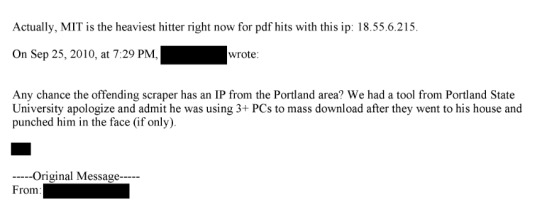


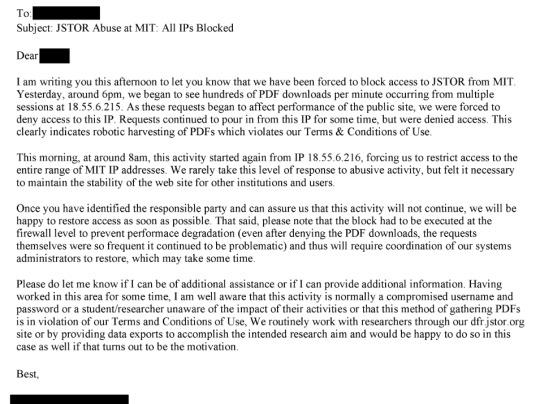
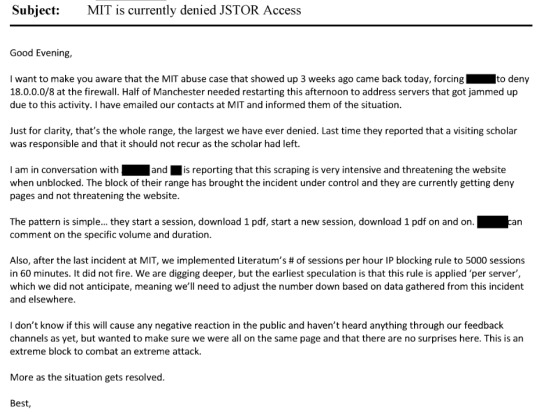
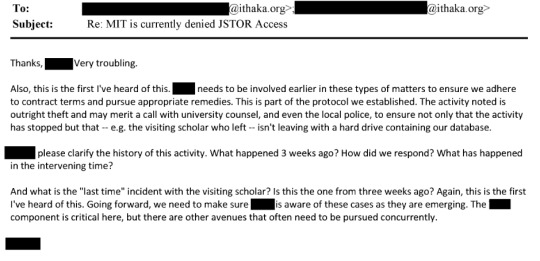
That's from page 175 of this document. This line: "The activity noted is outright theft and may merit a call with university counsel, and even the local police, to ensure not only that the activity has stopped but that - e.g. the visiting scholar who left - isn't leaving with a hard drive containing our database" is where I think the culpability starts.
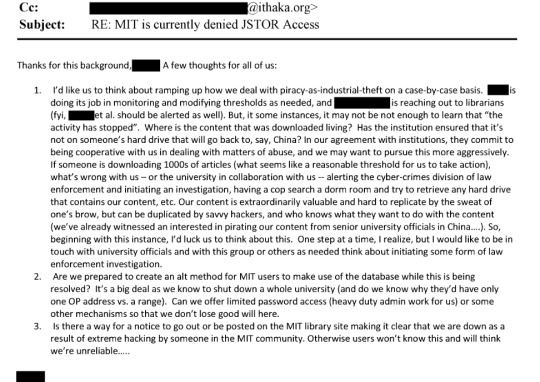
If someone is downloading 1000s of articles (what seems like reasonable threshold for us to take action), what's wrong with us - or the university in collaboration with us - alerting the cyber-crimes division of law enforcement and initiating an investigation, having cop search dorm room and try to retrieve any hard drive that contains our content, etc. Our content is extraordinarily valuable and hard to replicate by the sweat of one's brow, but can be duplicated by savvy hackers and who knows what they want to do with the content?
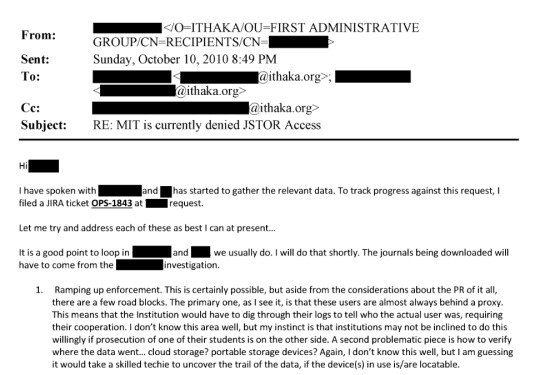
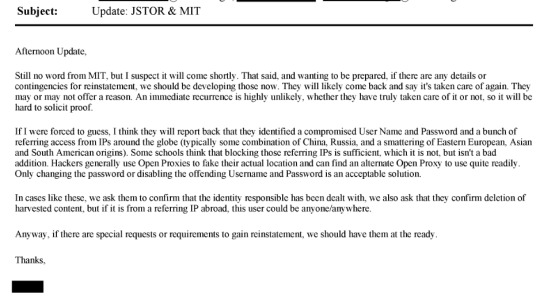
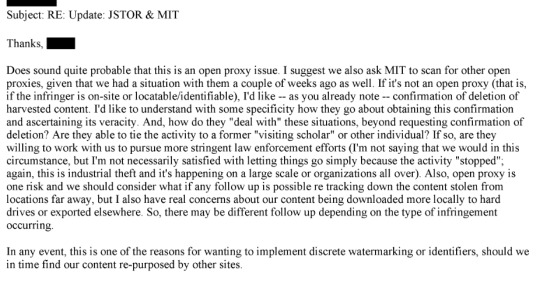
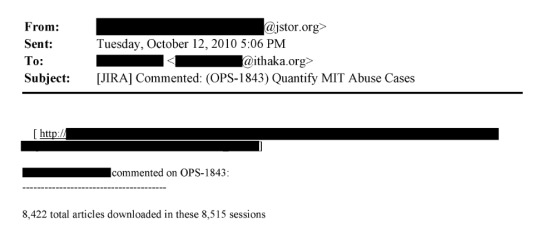
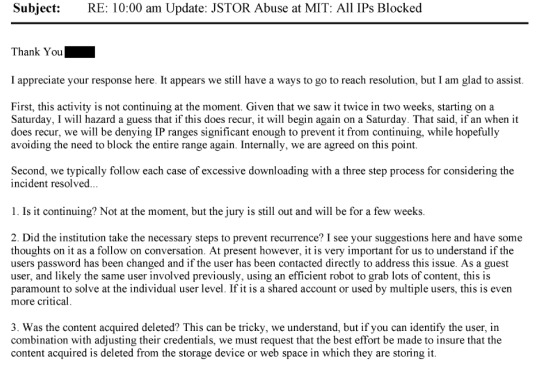
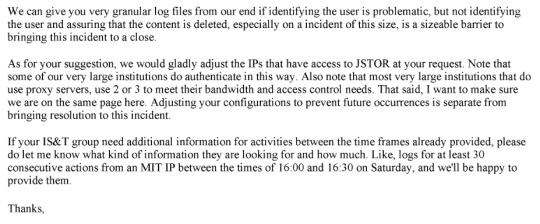
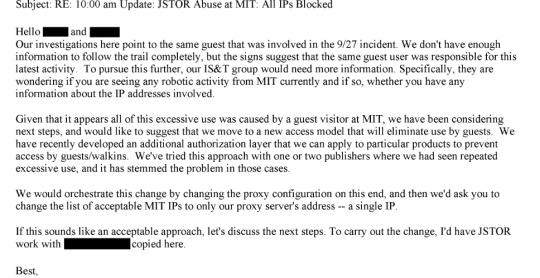
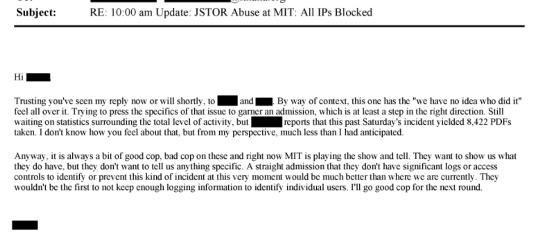
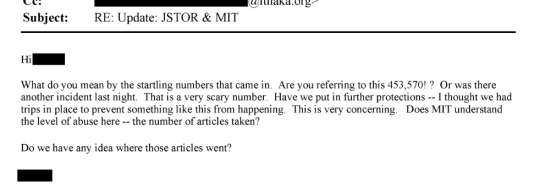

Page 379: "Does the university contact law enforcement? Would they be willing to do so in this instance?
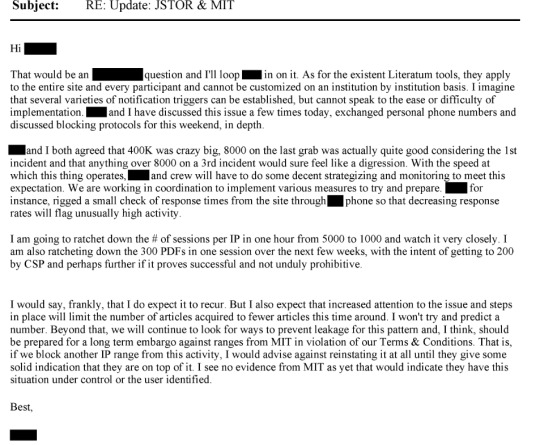

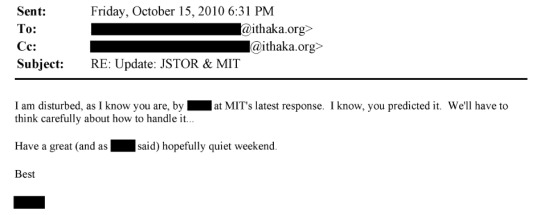
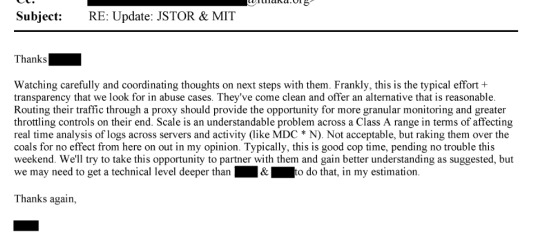
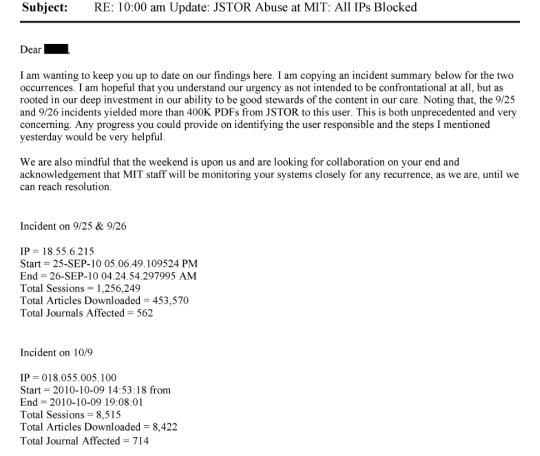
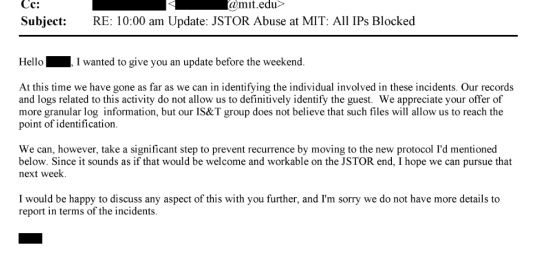
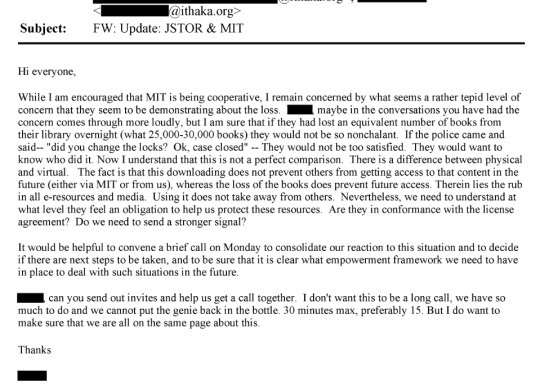
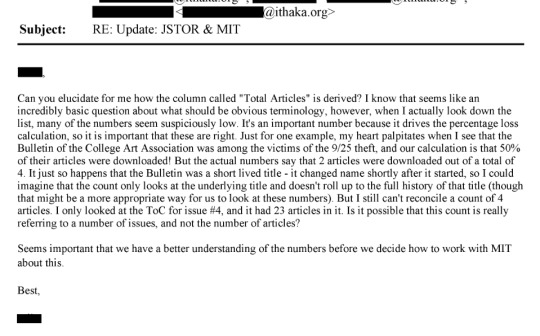
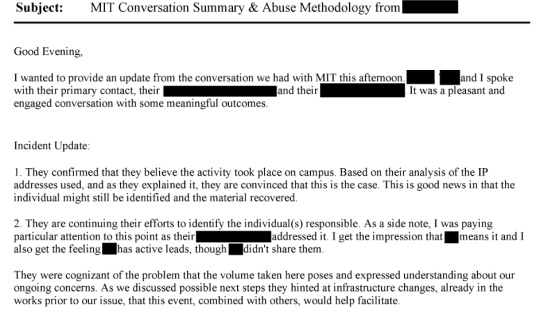
From page 1296:

I think the important thing to note here is that JSTOR had worked with MIT and had plans in place to prevent future similar downloads, but remained focused on identifying the person responsible for the downloads and ensuring that their data was deleted.

"I might just be irked because I am up dealing with this person on a Sunday night, but I am starting to feel like they need to get a hold of this situation right away or we need to offer to send them some help (read FBI).
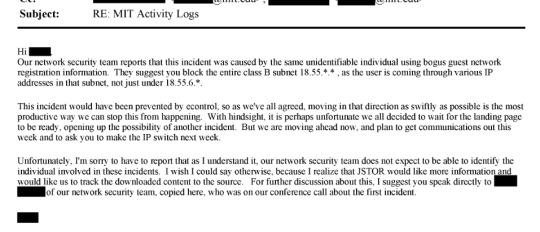
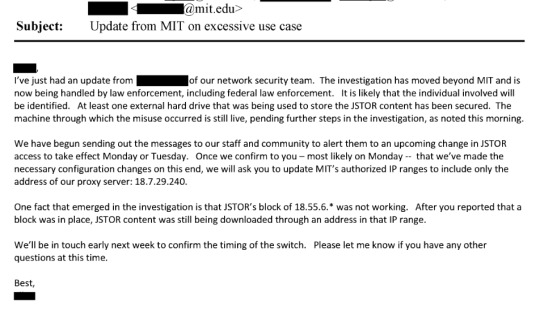
And there it is. Page 3093 of the document.
JSTOR can hem and haw about it all they want, but you can't un-call the cops.
MIT was working with JSTOR on preventing future incidents of pirating, but JSTOR repeatedly said that they weren't going to let it go, that it was unacceptable to drop the issue, that they were going to continue to pursue the pirate.
You can scroll through the document and see the JSTOR tech department and abuse team talking about Swartz as a script kiddie, and a hacker. You can see someone talking about how this was real theft - making the comparison to stealing books even while admitting that piracy doesn't close others out of access.
You can see the thread starts with a joke about punching someone in the face for hacking their system, and includes the tech team ominously considering whether they should threaten the MIT librarians with the FBI.
There's something really important to note here which I don't think that people who aren't PRETTY DEEP into hackery shit aren't aware of: US law enforcement is absolutely rabidly feral about prosecuting hackers. People may be more aware of this now because of Chelsea Manning and Edward Snowden (and perhaps a bit on tumblr because of maia arson crimew), but people who work in tech and who are in infosec - like the people joking about calling the FBI in these emails - would be aware of the bonkers disproportionate punishments faced by hackers. And knowing that, they kept pushing and pushing and pushing for identification of the hacker. They kept digging with MIT, they kept saying that simply preventing future incidents wasn't enough.
Early in the exchange someone from JSTOR asked "what's wrong with us - or the university in collaboration with us - alerting the cyber-crimes division of law enforcement and initiating an investigation, having cop search dorm room and try to retrieve any hard drive that contains our content, etc." and the answer is what happened to Aaron Swartz.
It is absolute bullshit for JSTOR to say "we arrived at a solution privately and didn't want to press charges" after law enforcement has gotten involved with a hacking case, especially one where they're talking about "real theft" and are attempting to quantify and emphasize the amount that was "stolen" from them.
The *public* may believe that private individuals or institutions are the ones who "press charges" but that's simply not the case. It's prosecutors who decide whether or not to go ahead with charges; they do it based on what cases they think they can win and what their office's perspective is on the crime. When you hear about people choosing to press charges it simply means that they decided to tell the prosecutor they wanted the case to go forward. It's up to the prosecutor whether or not that happens.
And the tech team at JSTOR had to know that law enforcement wasn't just going to wag a finger at an academic hacker.
There's a parallel here that happens sometimes when people have their identities stolen by their parents. If you mom takes out a credit card in your name, that's identity theft. That's fraud. That's illegal. If you reach the age of 25 and realize that your credit is ruined because your mom has been defaulting on cards in your name, you've got two choices to fix that: one is to accept the debt and pay it off and build up credit, and the other is to report the identity theft - which will end up with your mom in prison for a decade or so. Ruin your own personal finances, or your mom goes to jail for ruining your finances. So if you find out that your mom stole your identity you can't just call the cops to pressure her into transferring the debt to her name or something. That's not an option. The cops are not a threat to wave over people, they are not a way to get people to fall in line or act right. They aren't someone you can send to a college student's dorm room to retrieve a hard drive and have the matter drop.
When you call the cops on someone you are sending the full force of the law after them, and the full force of the law falls really heavily on hackers, and how heavy that blow can be is something that the JSTOR team must have been aware of when they were making snide comments about calling the FBI because they were frustrated with the noncommittal responses they were getting from librarians.
Ultimately it was the carceral state that killed Aaron Swartz, but they would not have been involved if JSTOR didn't think that what he did constituted theft.
Taking an *EVEN LARGER* step back from that, the idea that information can be owned and locked behind a paywall is what killed Aaron Swartz, someone who fought for information to be free.
Like. JSTOR is a licensing company. At the end of the day, cute social media posts and all, they're the same as the RIAA and ASCAB. They exist to extract a fee from people attempting to access information.
Aaron Swartz and all that he stood for are an existential threat to their core function.
Are JSTOR's hands as dirty as the federal prosecutors? Absolutely not. But they operate on a model that puts them in opposition to open information activists and it ended up with a hammer falling on Aaron Swartz that they dropped.
2K notes
·
View notes
Text
Applying a conservative estimate of four indirect deaths per one direct death9 to the 37 396 deaths reported, it is not implausible to estimate that up to 186 000 or even more deaths could be attributable to the current conflict in Gaza. Using the 2022 Gaza Strip population estimate of 2 375 259, this would translate to 7·9% of the total population in the Gaza Strip
(Source: The Lancet)
The Lancet is one of the oldest and highest impact peer-reviewed medical journals in the world. Deliberate undercounting of deaths is a key feature of genocides.
The Electronic Intifada estimated it at 193,000 a few days before.
The reported number of martyrs on Wednesday this week was 37,718. It’s important to note that this number only includes martyrs who have been identified by name and civil ID number through the beleaguered health ministry in Gaza. Given the breakdown of reporting systems due to heavy destruction of infrastructure and personnel, this number, even with its limited parameters, is a gross underestimation. Based on more accurate figures of approximately 370 people killed daily, multiplied by 264 days of genocide, the actual number is closer to 97,680 martyred. (Per OCHA estimate of 15 martyrs per hour: Over the course of 264 days, which amounts to 6,336 hours, this number would roughly be 95,040).
...
Based on these estimates, both conservative and data-driven, respectively, the actual figures are likely as follows: • 377,280 buildings destroyed completely or partially • 95,040—97,680 martyred • 221,760 injured • 24,750 dead or dying from starvation • 42,000 missing (presumed dead, kidnapped by Israel’s occupying forces or possibly trafficked). The following ranges represent conservative estimate or lower range of data-driven population estimates: • 17,050—94,049 with chronic illnesses dead from lack of medication • 14,408—255,985 dead from epidemics resulting from Israel’s assault This means the actual number of dead is closer to 194,768—511,824 people, with 221,760 injured. And counting.
(Source: The Electronic Intifada)
Israel surrounded the last remaining hospital in the Gaza Strip with tanks and ordered it evacuated and shut down 12 hours ago.
If you still want to believe the pussy-footing toll of counted and reported deaths that can stand up to Western propaganda, after nine fucking months of dropping more than 70,000 tons of bombs on a 41 kilometer strip, exceeding World War II bombings in Dresden, Hamburg, London combined, rather than the statistical breakdown of humanitarian orgs and medical journals, then have at. There's no point telling you to believe the victims and question your own biases towards your own heavily propagandized establishments.
But if you can do basic math, then please use The Lancet's estimated death toll. The massacre of 8% of the Gaza Strip is a conservative estimate and still apocalyptic. Resist all attempts to diminish it. Remember that this is the result of the United States's obstruction of justice and open-handed abetting of genocidaires. Keep fighting.
Btw:
While the war itself is estimated to have generated between 420,265 and 652,552 tonnes of carbon dioxide equivalent (CO2e) so far—equivalent to burning more than 1.5 million barrels of oil—this figure soars to more than 61 million tonnes when pre-and post-war construction and reconstruction are included. This is more than the annual emissions of 135 individual nations—but there is currently no legal obligation for militaries to report or be held accountable for their emissions.
(Source: EuroNews)
#gaza genocide#palestinian genocide#free palestine#zionazis#i've been keeping out of the news but between the undercounting and shutting down gaza's last hospital#climate collapse#climate change#climate emergency#ecocide#death to israel#euro med monitor#electronic intifada#the lancet#knee of huss
683 notes
·
View notes
Note
how do i know what’s right?
i feel like i have zero critical thinking skills ;-;
a lot of the time when someone poses an idea or a theory they think they’re right, and so they use language that enforces that. but then someone refutes it, and uses language affirming what they believe and i see the point in their argument. and then it gets refuted again and again and again and im just confused.
hi great question. i would love it if there were a single easy litmus test to figure out who's 'right' and whose info i should trust! unfortunately things are rarely this easy, and it's actually completely normal to be overwhelmed by the amount of information being produced and shared, especially when it comes to topics you haven't researched/lived/etc. for most of us, this will be most topics!
i'd preface this by saying that i think your overall attitude here is actually a good one. you're framing it in a pretty self-deprecating way—but actually, imo this type of openness to discussion and disagreement is a really good place to start, esp when dealing with topics that are new to you. nobody enters a contentious debate with a fully fledged, defensible viewpoint. you might feel like you're just treading water here, making no progress toward being able to evaluate arguments for yourself, but i highly doubt that's true.
all of that said: while i again cannot give you a single litmus test for figuring out what's 'right', there are four pretty basic sets of questions that i automatically run through when encountering a new idea, source, topic, or argument: we can call these origin, purpose, value, and limitations.
origin: who's the author? do they have any institutional affiliations? who pays their salary? is this argument or paper funded in any way? is the argument dependent upon the author's social position or status (race, class, etc) and if so, are those factors being discussed clearly? does the author have ties to a particular nation-state or stakes in defending such a nation-state? what's the class character of the author and the argument? what's the social, economic, and intellectual context that gave rise to this argument or source?
purpose: why is this source or person disseminating this information or making this argument? are they trying to sell you anything? are their funders? are they trying to persuade you of a particular political viewpoint? keeping in mind the answers to the 'origin' questions, are there particular ideological positions you would expect to find in this source or argument, and are they present? what are the stakes for the author or source? what about for those who cite the source or further disseminate or publish it?
value: what does this source or argument accomplish well? what aspects of the argument are new to you and strike you as insightful? are there linkages being made that you haven't encountered elsewhere, and that you think are effectively and sufficiently defended? are there statistics or empirical data that might be useful to you in forming your own argument, even if you disagree with how this source or author is interpreting them? what does this argument or source tell you about the types of debates being had, and the rules of those debates?
limitations: where does this argument or source fail you or fall apart? are there obvious rhetorical fallacies you can identify? is the author forgetting or overlooking some piece of information that you know of from elsewhere? which viewpoints may be omitted? keeping in mind the answers to the 'purpose' questions, if this source is defending a particular ideology or political position, is that one you agree with? is it only defensible so long as the author omits or distorts certain pieces of information? are there points where the argument jumps from evidence to a conclusion that the evidence can't fully support? are there alternative explanations for the evidence?
over time you will often find that it becomes more and more automatic to ask yourself these questions. you will also find that the more you read/hear about a particular topic, the faster you can determine whether someone is presenting all of the evidence, presenting it fairly, and using it to fully defend the argument they ultimately want to make. and you will probably also find that at some point, you're able to synthesise your own argument by pulling the strong parts from multiple other people's viewpoints, combining them with your own thinking, and fitting them together in a way that adequately explains and materially analyses the issue at hand.
#sry if this feels kind of abstract lol fight between specificity and applicability#lit and literacy
2K notes
·
View notes
Text

I'm going to ask people to stop spreading the idea that all black people disappeared from Argentina because "we killed them all". Is Argentina racist? Of course it is. But leaving aside the African and Afro-descendant population of recent migrations (20th century), the problem with the Afro-descendant population in Argentina is that it's still incredibly invisibilized, especially the one with roots going back to colonial times.
1) Any Argentine will have heard of the "crisol de razas", ("melting pot"), the metaphor linked to the supposed "homogeneous" integration of the entire foreign population that arrived in the country during the era of the great waves of immigration (1890-1920). This concept, in addition to establishing a false equivalence between "nationality" and "race", always left out the Afro-descendant and indigenous population, not because they didn't exist but because there was a need to create the myth of a "white Argentina".
2) There are other sources of invisibilization:
a) At the end of the 18th century, the Spanish monarchy approved a Real cédula called "gracias al sacar" which established "monetary compensation" (a payment, so to speak) so that freed black people could acquire the status of "white" and thus access some of the privileges and benefits that this position entailed (it's important to note that in colonial times, at least here, "white", "black" or "indian" were legal categories rather than racial).
b) During most of the 20th century, the DNI (Documento Nacional de Identidad, "National Identity Card") included a description of the physical traits of individuals, one of which was skin color. One such color was "trigueño", a category difficult to describe accurately because it was used very broadly to describe people who were "brown" or "morenos", neither black nor white. As Miriam Gomes (activist and literature professor) mentions (in Spanish), many black people were pigeonholed in this category (in Spanish, see min. 21:40), which contributed to their invisibilization. Imagine that this category was so broad that even my own paternal grandmother, who has Mapuche (but not black) ancestry, was also labeled as "trigueña".
3) According to the 2022 Census, the population that recognizes itself as Afro-descendant or has black or African ancestors totals 302,936 people in the national territory. This population group constitutes 0.7% of the total number of people living in private homes, while in the 2010 Census it represented 0.4%. [[I must remember that we should take into account the possibility that for whatever reason there are people who don't know or don't identify themselves as Afro-descendants even though they are]]. The third graph of the linked document shows that most of the Afro-descendant population in Argentina is located in those provinces/jurisdictions that concentrated the black population (either enslaved or free) during the colonial period (i.e. Buenos Aires, Cordoba, Santa Fe and the Ciudad Autónoma de Buenos Aires). Unfortunately, this graph doesn't provide information on the migratory origin of this population, but according to the data I risk establishing a certain continuity with the colonial period.
4) I will strongly urge you to follow Afro-Argentine activists and people who write about their history to get any doubts you may have out of your mind: I recommend Miriam Gomes, Sandra Chagas, Piba afroqom (@ pibaafroqom on Instagram), Mesa Afro Córdoba (@ mesaafrocordoba on instagram), Malungo Libros (@ malungo_libros), GEALA (Grupo de Estudios Afrolatinoamericanos), Comisión 8N (@ comision8n), and Asociación Misibamba (@ misibamba).
135 notes
·
View notes
Text
“Treasury has been denying that they gave Marko write access, but I am looking at his access request right now”
So they have “read and write” access, or even “read only” access, why do we care? What are the possible consequences?
1. Musk, Trump and their respective cronies have unrestricted access to your social security numbers, your confidential bank information, your confidential medical information and so much more.
This is true with just “read only” access. This is why the burgeoning media war (that currently “read only” is winning unfortunately) is something of a red-herring. It matters, don’t get me wrong. As a source yesterday said, Apocalyptic. But that source also said that “read only” was “catastrophic”. If the smash and grab operation commences just as stupidly, quickly and dangerously as it has so far, this could easily become identity theft by an untold number of people using their personally identifiable information within weeks.
This kind of information can also be used to target enemies and, if they get operational control elsewhere, the capability of using the Anti-Money Laundering (AML), Know Your Customer (KYC), & the Combating the Finance of Terror (CFT) laws to target political enemies. Of course, these laws have already been used to target political dissidents; but we are talking about something of an incomprehensibly larger scale. As one long time payments lawyer wrote to me: “Is DOGE using its own, non-OFAC definition of ‘terrorist group’ that has no basis in law?” In this sense, the Democratic party has fully and unequivocally participated in building the apparatus that is showing to be extraordinarily easily weaponized against them. In short, they can not just steal money but eliminate the financial existence of anyone they felt like, if operational control gets sufficient. The week Trump won his second term, I told a room full of Democratic party operatives that “if the Democratic Party really believed Trump was a fascist, they would destroy the servers containing all the surveillance data.”
2. Creating “backdoors” into the Treasury’s multi-trillion dollar payment system
I’m running short on time (it's late at the time of writing) and I have to get up in the morning and be prepared for another round of intensive interviews so this will have to be more carefully detailed in the future. But these are extremely sensitive systems, and complicated systems. All the factors that slow them down in taking over the system are also the factors that would make it hard to find intentionally hidden code to their benefit that could give them ongoing access to the system even if they are removed. I need to do more reporting on this one but it is something many, many sources have mentioned
3. Subordinate the judicial system to the Trump Administration/DOGE
This one has been hard to get across to readers. As you can imagine, the overwhelming social media response to this reporting has focused on the absurd illegality of the actions. Asking for judicial intervention. But as I covered in my piece Friday, the constitution is not self enforcing and the supreme court is unlikely to step in, or to step in a positive way. In my Friday’s piece I unfortunately presciently asked:
As a famous twentieth century statesman might have said in this situation "...and how many divisions does the Constitution have?”
What happens if they are just embedded so deeply in the heart of government payments that there is no mechanism to dislodge them? Court Injunctions are not self enforcing either My longtime payments lawyer source agrees with this point, which I also tried to articulate Monday:
Chokehold to stop or delay any and all payments initiated by federal agencies, and potential mechanical method to thwart judicial rulings when a judge/court says “You as the Executive Branch cannot stop federal grants/payments lawfully approved and directed by Congress.”
As we’ve seen, there are no armed law enforcement figures coming in to save the day and if Musk's DOGE get deep enough into the Bureau of the Fiscal Service, the only way to enforce the law is through street actions.
4. Elon Musk can use this system against his enemies.
It almost feels quant to say because the timeline of so many of the other possibilities are so immediately and dramatically dire that this one almost feels hopeful in comparison in that it implies “competitive position” being something that is very meaningful. Nevertheless, it should be obvious that this information, which includes information on all businesses the Federal Government does business with, is ripe to be used to kneecap competitors. Specifically my longtime payments lawyer source brought up just outright putting competitors on the “do not pay” list. The “good case scenario” may just be an economy increasingly dominated in all corners by Musk and/or Trump through a sprawling network of business ventures with the greatest possible advantages.
5. The New American Payments System, X the Everything App
For this one I am just going to quote my longtime payments lawyer source at length. They’ve got it and note this is a “read only” issue. Imagine the worst case of paying your taxes on X payments, or “receiving” your social security payments there.:
Obtaining access to and potentially exfiltrating data sets from BFS that may be characterized as “anonymized” (in order to evade criticism about potential violation of privacy laws), but could give insight into payment patterns and payment system strengths, weaknesses and behaviors:
1. Such information obtained on an inside track by DOGE would be very helpful, for example, if you are an entity like X Payments LLC and are currently licensed as a money transmitter in 42 states with plans to launch as-yet-to-be specified payments and financial services.
2. It is unclear whether there are any limitations on DOGE personnel transferring payment information to X Payments LLC in order for that company to gain proprietary information regarding federal payments in an anti-competitive manner compared to its fintech competitors currently in the marketplace.
3. Such single-sourced information not available to other market competitors would provide an anti-competitive jump for X Payments LLC on ApplePay, Google Pay, Samsung Pay (mobile wallets) and a host of other fintech companies in the marketplace backed by venture capital and private equity funding.
6. Ability to pick and choose who gets public money, regardless of congressional directives
I covered the constitutional aspects of this crisis Friday. The payment aspects I covered Monday. Without Judicial ability or willingness to sanction Trump & Musk, There is very little left of congress. The “power of the purse” is central to the rule and authority of congress. The decentralized (in relative terms) nature of administrative agencies means that there are enormous opportunities for agencies to follow the law. This is a place to skip past all those headaches.
7. Subordinate the judicial system to the Trump Administration/DOGE
This one has been hard to get across to readers. As you can imagine, the overwhelming social media response to this reporting has focused on the absurd illegality of the actions. Asking for judicial intervention. But as I covered in my piece Friday, the constitution is not self enforcing and the supreme court is unlikely to step in, or to step in a positive way. In my Friday’s piece I unfortunately presciently asked:
As a famous twentieth century statesman might have said in this situation "...and how many divisions does the Constitution have?”
What happens if they are just embedded so deeply in the heart of government payments that there is no mechanism to dislodge them? Court Injunctions are not self enforcing either My longtime payments lawyer source agrees with this point, which I also tried to articulate Monday:
Chokehold to stop or delay any and all payments initiated by federal agencies, and potential mechanical method to thwart judicial rulings when a judge/court says “You as the Executive Branch cannot stop federal grants/payments lawfully approved and directed by Congress.”
As we’ve seen, there are no armed law enforcement figures coming in to save the day and if Musk's DOGE get deep enough into the Bureau of the Fiscal Service, the only way to enforce the law is through street actions.
8. Elon Musk can use this system against his enemies.
It almost feels quant to say because the timeline of so many of the other possibilities are so immediately and dramatically dire that this one almost feels hopeful in comparison in that it implies “competitive position” being something that is very meaningful. Nevertheless, it should be obvious that this information, which includes information on all businesses the Federal Government does business with, is ripe to be used to kneecap competitors. Specifically my longtime payments lawyer source brought up just outright putting competitors on the “do not pay” list. The “good case scenario” may just be an economy increasingly dominated in all corners by Musk and/or Trump through a sprawling network of business ventures with the greatest possible advantages.
9. The New American Payments System, X the Everything App
For this one I am just going to quote my longtime payments lawyer source at length. They’ve got it and note this is a “read only” issue. Imagine the worst case of paying your taxes on X payments, or “receiving” your social security payments there.:
Obtaining access to and potentially exfiltrating data sets from BFS that may be characterized as “anonymized” (in order to evade criticism about potential violation of privacy laws), but could give insight into payment patterns and payment system strengths, weaknesses and behaviors:
1. Such information obtained on an inside track by DOGE would be very helpful, for example, if you are an entity like X Payments LLC and are currently licensed as a money transmitter in 42 states with plans to launch as-yet-to-be specified payments and financial services.
2. It is unclear whether there are any limitations on DOGE personnel transferring payment information to X Payments LLC in order for that company to gain proprietary information regarding federal payments in an anti-competitive manner compared to its fintech competitors currently in the marketplace.
3. Such single-sourced information not available to other market competitors would provide an anti-competitive jump for X Payments LLC on ApplePay, Google Pay, Samsung Pay (mobile wallets) and a host of other fintech companies in the marketplace backed by venture capital and private equity funding.
10. Ability to pick and choose who gets public money, regardless of congressional directives
I covered the constitutional aspects of this crisis Friday. The payment aspects I covered Monday. Without Judicial ability or willingness to sanction Trump & Musk, There is very little left of congress. The “power of the purse” is central to the rule and authority of congress. The decentralized (in relative terms) nature of administrative agencies means that there are enormous opportunities for agencies to follow the law. This is a place to skip past all those headaches.
11. Catastrophic failure of the payments system.
Even a disruption for a day would be a disaster. A disruption on longer timescales would have unimaginable knock on effects. The Treasury could involuntarily default because of operational issues. The worst case scenarios, which are completely and utterly plausible at the time of writing, would be a catastrophe without precedent. No typical economic calamity like the Great Financial Crisis or even the Great Depression would be comparable.
87 notes
·
View notes
Note
I came across this paper:
https://www.academia.edu/71372307/Trans_masculinities_embodiments_performances_and_the_materiality_of_gender_in_times_of_change
I'm not well-versed in academic language so I can't really understand all of it, but it seems kind of gross and condescending, especially when it's using testimonials of transmasc's desire to be seen as men to, idk, prove that masculinity isn't really queer or something? I'm curious how other (smarter) people would interpret it.
I mean, your understanding of it is just as important as mine! I'm happy to add my thoughts, though.
My understanding is that their thesis is essentially "masculinity is related to maleness and the male body specifically, and we know that because transmascs want to have male bodies". They allow for some nuance here in references to other literature, and I agree with that angle of their argument overall, but their premise is fundamentally flawed in the exclusion of trans theory and trans narratives.
Like, yes, masculinity is in some way related to appearance and the "male body", and there are a lot of reasons for that! But is the dysphoria of trans people really ironclad "proof" of what maleness and masculinity are? And why don't they spend any time talking about what dysphoria actually is, what trans people think it is, why trans people think they feel the way they do, or what trans academics have to say about any of this?
I have a lot of other issues with this paper as well, and I could probably write a paper just as long as theirs going into all of the reasons for that. But I think that answers your biggest question; what they're trying to prove, how they're trying to prove it, and why that comes across so weird.
To your other question ("is it condescending?"): I think this is kind of subjective overlay, but the way they go about analyzing their data is pretty condescending, in my opinion. They tend to frame their participants' responses as kind of misguided or ill-informed, particularly Diniz- who they definitely discuss as "trying to justify his choices" to identify as nonbinary while also seeking medical transition, like this is inherently contradictory and must therefore rely on some kind of delusion or desperation. It's weird!
I do also want to point out, briefly, that they also really cherrypick which claims they bother sourcing, and how they try to back them up.
They argue that trans men have male privilege based on the opinions of, like, three of their 30 total participants- and then carry this as "fact" through the entire paper, uncontested. That's extremely fucking weird and super suspect in a paper like this! I just wrote my own qualitative research paper based on interviews (which is what this is), and it's pretty standard to acknowledge the limitations of your research, and to position your results as non-definitive. Like, that's been a major part of every discussion with everyone I've talked to about my research. I would not have been greenlit to receive my degree if I hadn't been careful to avoid framing my research the way these people frame theirs.
The other weird thing they do is cherrypick statistics- or rather, one single statistic- to "prove" that transmascs do not suffer as much as other trans people, or possess some kind of privilege. They only cite murder statistics from one source; apparently that's the only relevant metric for quantifying all oppression? They also fail to acknowledge any possible shortcomings of this statistic, like the issues of under-reporting and misgendering of transmasc victims.
I could go on; I have a lot of gripes. But I think your criticism is totally valid, this was a weird and frustrating read.
Also curious if @genderkoolaid has thoughts- you tend to talk about gender studies from an academic position more, and you probably have a lot more field-specific expertise than I do. I'll boost other additions too, I love a good academic discussion!
298 notes
·
View notes
Text

"In their statement on Friday, NPD warned that the “the information that was suspected of being breached contained name, email address, phone number, social security number, and mailing address(es).” It recommended the public to take a number of steps to safeguard their identities, including freezing their credit and putting fraud alerts on their files at big credit bureaus.
The breach came to public awareness after a class-action lawsuit was filed August 1 in U.S. District Court in Florida, which was first reported by Bloomberg Law.
National Public Data did not share how many people were at risk, but hackers, who have been identified as part of the hacking group USDoD, have been offering, for sale, what they claimed were billions of NPD records since April, though the Washington Post reported that “security researchers who looked at the trove said some of the claims were exaggerated.”"
source 1
source 2
source 3
free database created by Pentester to see if your information has been leaked
#destiel meme news#destiel meme#news#united states#us news#cybersecurity#data breach#hacking#tech industry#cyber security#identity theft#social security#national public data
227 notes
·
View notes
Text
Writing Notes: Scientific Literacy

Scientific Literacy - the ability to parse through scientific information and understand it. Furthermore, it can entail the knowledge necessary to conduct experiments, hypothesize about new data, and think critically about the wider world.
How to Improve Scientific Literacy
The more science literate a society becomes, the better equipped it is to meet the challenges of the contemporary world. Consider these ways to improve the public understanding of science:
Combat misinformation. Science education is essential to combating misinformation. Unless people know how to vet sources of information, they’re more prone to take untrue or science illiterate alternatives at face value. This has led to people outright denying the reality of climate change and global warming, as well as refusing to take life-saving vaccines.
Demonstrate the real-world value. People are more likely to achieve scientific literacy when they see it has pragmatic value. Show students how an increased understanding of science can boost economic productivity, increase personal well-being, improve professional development, and have a positive general impact on their everyday lives.
Specify needed skills. There are many different important science literacy skills, so help people break them down into manageable chunks. Walk students through how to form a hypothesis, conduct an experiment using the scientific method, or read through a science paper and evaluate its veracity.
Take a wide-angle view. Encourage people to study all sorts of different scientific fields. For example, someone may have a hard time understanding the scientific processes underlying a life science (like chemistry) but also take to a more physical branch of the field (like earth science). You could then use their enthusiasm for the latter to inspire them to work harder to understand the former. Utilize different science teaching strategies to encourage a love of the field in general.
How to Evaluate Scientific Literacy
There are various approaches you can take to test for scientific understanding. Here are a few key ways to evaluate literacy in the science classroom:
Follow an established science curriculum. You can find plenty of curricula to guide your own personalized science education goals. For example, institutions like the American Association for the Advancement of Science and the National Academy of Science provide general wisdom about how to teach students to become science literate throughout their time in school.
Start a dialogue. Constant conversation and experimentation are part of the very nature of science. As such, scientific inquiry requires a group approach to problem-solving. Ask your students to help each other deepen their understanding of scientific concepts and step in to assist them along the way. See if they’re grasping these concepts as you talk to them.
Test for knowledge. Try to test for knowledge of science concepts in multiple different ways. Ask your students to conceive of and conduct an experiment from start to finish. Encourage them to write a scientific research paper with the appropriate citation format, utilizing peer-reviewed resources. Provide traditional multiple-choice tests to evaluate general scientific knowledge as well.
The Importance of Scientific Literacy
Scientific literacy enables you to understand why things are the way they are. Becoming a science-literate person can lead to or contribute to:
A greater impetus to act on important issues: Scientifically literate citizens are more likely to act when science indicates a crisis is on the horizon. Scientific issues often become political and ethical issues, drifting out of the lab or classroom into the real world. Science teachers help their students identify issues like these as well as propose ways they can act to solve them.
A greater understanding of the world: From elementary to high school science and beyond, teachers do their best to explain the wonders of the natural world to their students. Scientific knowledge expands your ability to grasp mysteries you previously thought of as inscrutable and unsolvable.
Improved critical thinking skills: Science learning allows you to hone your critical thinking skills in a way that can apply to a vast array of other arenas in your life. As you comb through scientific evidence and assess data, you train yourself to think objectively. Core competencies like these have far-reaching benefits on your general decision-making capabilities.
At a very early age, even elementary school students receive exposure to scientific concepts in the interest of building this sort of literacy.
Schools follow national science education standards to bring the next generation up to speed on everything from physics and chemistry to the broader life and social sciences.
Certain scientific authorities lament what they see as the low standards of scientific literacy throughout contemporary society.
They insist we need education reform to ensure the general public can better learn to see the world through a science-oriented lens.
Source ⚜ More: Notes & References ⚜ Writing Resources PDFs
#science#literacy#writing reference#character development#writeblr#writers on tumblr#dark academia#spilled ink#writing prompt#creative writing#literature#writing inspiration#writing ideas#light academia#lit#writing resources
60 notes
·
View notes
Note
I should probably preface this by saying that this is a genuine question, not an attempt to "own" anyone, not a troll, etc. I'm genuinely curious and interested: Has there been any good scientific studies done on the question "Does having a kink about a 'problematic' subject, reading about it, fantazising about it, roleplaying it, etc., make a person more or less likely to do that problematic thing in real life?" Do you know of any good research papers or articles on the subject? Maybe it's a whole field of study?
I feel like if I ever (god help me) would have to defend a position of "other people's kinks, no matter how disgusted they might make me feel personally, are none of my business" to someone, it would be useful to have some kind empirical science to point towards.
Again, I'm not trying to be a jerk saying "source, please?", I'm genuinely interested in reading about it.
So a good place to start here is in thinking about how this kind of topic gets data collected about it. So if you're wondering about the relationship between, for example, fantasizing about bestiality and actually abusing animals, your primary way of being able to study actual, real-world behavioral outcomes would be to identify a source of data on acts of bestiality...which would almost exclusively come from the police state. If you really wanted to study who actually does commit these acts and what their history was, you'd have to look at people who were convicted for having committed animal abuse of a sexual nature.
The problem is, that data isn't necessarily representative of what abuse actually occurs and how often. The police aren't trustworthy, the carceral justice system is profoundly unjust, not every person gets investigated or tried fairly, and even if all those systems DID operate justly and fairly, you'd still be missing all the people who never got caught. And we know that since these systems are racist, classist, ableist, etc, that they are not 'catching' real offenders from all groups equally. Poor & Black people who have committed these acts are most likely to get caught, rich & white ones least likely. And so the data is skewed.
This is FURTHER complicated by the fact that even if you do look at this data, you are only seeing the people who *have* harmed animals sexually, not the people that haven't, and so that is going to be susceptible to confirmation bias of your prior assumptions and not be representative of the whole population if you use it to draw conclusions. So, for instance, if you look at the porn habits of every person who has been convicted for bestiality, you will probably find a lot of bestiality porn (both fantasy and real) in their histories. Okay, not surprising... but of the average people watching this porn, how many actually go on to offend and how many don't? We have no way of knowing. And because such an activity is so stigmatized (and in the case of real porn, itself illegal), you're going to not be able to get self-report surveys from the general population on this.
If you did try to give out surveys on this kind of stuff, you might be forced to report any of your respondents who did admit to doing something illegal. It wouldn't really pass most ethics boards to do this research at all.
So you can see why this is such a shadowy field of discussion. The thing to keep in mind is that the number of people who do get arrested for things like bestiality, child sexual abuse (especially the kind that is driven by an attraction to children rather than your garden variety case of a parent abusing their power over their kids in multiple ways, including sexual, but the sex is incidental), etc are very small. These are vanishingly uncommon crimes. and we can't really trust the police state to give us reputable information on this. and it is very hard for scientists to study well, and most who study it do approach it in a pretty sensationalistic way.
So, to answer your question, yes you can hop onto google scholar and dig around for studies on 'paraphilias' and their relationship to criminal offenses, but most of it is going to be profiles of people locked in mental health institutions and jails that SOUNDS super scary and fucking disgusting but is not a good reflection of whatever the hell is going on in the actual world. I think it's evident that a hell of a lot more people are fantasizing about this stuff than are offenders. Especially if we are drawing a distinction between fantasy and porn that depicts actual abuse. The people drawing dogs fucking on like deviant art or whatever probably do not pose any actual threat to real animals 99.99% of the time.
And if and when a person with a desire to DOES harm animals, it is because of the legal construction of animals as property that it is possible for them to do so. once again power is the root of the crime. more than a 'paraphilia' making someone like, evil. a lot of this stuff is values based and a philosophical case about how the world works rather than a specific statistical claim. but the number of real offenses that happen are so vanishingly thin that we could barely empirically study them anyway -- it's too small a sample size, and there is no ability to locate comparison groups of non-offenders who share these kinks.
I hope this helps answer your question. Obviously I am using bestiality as one example here but you could apply this to CNC and rape porn, child abuse and age play porn, etc etc.
82 notes
·
View notes